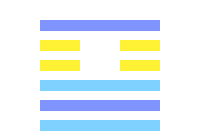Hexagramme 26 du Yi Jing
L'hexagramme : 26
Un hexagramme est une combinaison de six traits yin et yang.

26 - THE TÂ KHÛ HEXAGRAM.
Under the conditions of Tâ Khû it will be advantageous to be firm and correct. (If its subject do not seek to) enjoy his revenues in his own family (without taking service at court), there will be good fortune. It will be advantageous for him to cross the great stream.
Bing DeepL Google Yandex26 - Checking
See if everything is alright. That way, one will find the invisible problems.
Bing DeepL Google Yandex26 - Checking
See if everything is alright. That way, one will find the invisible problems.
Bing DeepL Google Yandex26 - Tá tchu, le pouvoir contraignant de la grandeur
Tá tchu : 1. Grand entretien ; 2. Dompter, conduire
Texte
Grand, bon entretien. Il affermit et perfectionne. Si l’on ne ruine pas sa maison (la dévore), ce sera bien ; on traversera heureusement les difficultés.
Symbolisme
C’est une montagne dans le ciel (le ciel au milieu). Le sage, comprenant toute chose, discute d’abord, puis agit, pour entretenir ainsi sa vertu.
Commentaire
Le grand entretien, c’est le fort affermissant sa droiture, sa justice, répandant un brillant éclat ; renouvelant chaque jour ses vertus. Fort et élevé, il met la sagesse au-dessus de tout ; il peut s’établir fermement en une droiture extrême. Il entretient surtout la sagesse ; il répond aux ordonnances du ciel.
26 - La vérification
Aller voir si tout va bien. Ainsi on découvrira les problèmes invisibles.
Bing DeepL Google Yandex26 - Ellenőrzés
Megnézni hogy minden rendben van-e. Ily módon felfedezheti a rejtett problémákat.
Bing DeepL Google YandexLes trigrammes
Les trigrammes sont des combinaisons de trois traits yin et yang. Dans l'hexagramme, les trois traits du dessous constituent le trigramme inférieur et représentent la situation intérieure. Les trois lignes du haut constituent le trigramme supérieur et représentent la situation extérieure.
Trigramme supérieur : La montagne

Trigramme inférieur : Le ciel

Commentaires des traits
The lines represent the evolution of the hexagram, from the bottom (young) to the top (old).

26.1 (26 > 18) - THE TÂ KHÛ HEXAGRAM.
The first line, undivided, shows its subject in a position of peril. It will be advantageous for him to stop his advance.
Bing DeepL Google Yandex26.1 (26 > 18) - Staying away
One doesn't want to go and see it immediately because it is less important.
Bing DeepL Google Yandex26.1 (26 > 18) - Staying away
One doesn't want to go and see it immediately because it is less important.
Bing DeepL Google Yandex26.1 (26 > 18) - Tá tchu, le pouvoir contraignant de la grandeur
Tá tchu : 1. Grand entretien ; 2. Dompter, conduire
Quand il survient quelque danger, il est bon de s’arrêter (se vaincre), de céder aux circonstances et de ne point vouloir l’emporter de force.
Bing DeepL Google Yandex26.1 (26 > 18) - Rester à l'écart
On ne veut pas aller voir tout de suite car c'est moins important.
Bing DeepL Google Yandex26.1 (26 > 18) - Ellenőrzés
Nem akar menni és azonnal megnézni mert nem olyan fontos.
Bing DeepL Google Yandex
26.2 (26 > 22) - THE TÂ KHÛ HEXAGRAM.
The second line, undivided, shows a carriage with the strap under it removed.
Bing DeepL Google Yandex26.2 (26 > 22) - Being sidelined
One leaves because one is not being trusted.
Bing DeepL Google Yandex26.2 (26 > 22) - Being sidelined
One leaves because one is not being trusted.
Bing DeepL Google Yandex26.2 (26 > 22) - Tá tchu, le pouvoir contraignant de la grandeur
Tá tchu : 1. Grand entretien ; 2. Dompter, conduire
(Comme, par exemple, quand) un char a perdu le cuir qui le maintient en place (droit).
Bing DeepL Google Yandex26.2 (26 > 22) - Être mis sur la touche
On part car on ne nous fait pas confiance.
Bing DeepL Google Yandex
26.3 (26 > 41) - THE TÂ KHÛ HEXAGRAM.
The third line, undivided, shows its subject urging his way with good horses. It will be advantageous for him to realise the difficulty (of his course), and to be firm and correct, exercising himself daily in his charioteering and methods of defence; then there will be advantage in whatever direction he may advance.
Bing DeepL Google Yandex26.3 (26 > 41) - Following one's partner
One is accompanied by someone who is pursuing the same goal.
Bing DeepL Google Yandex26.3 (26 > 41) - Following one's partner
One is accompanied by someone who is pursuing the same goal.
Bing DeepL Google Yandex26.3 (26 > 41) - Tá tchu, le pouvoir contraignant de la grandeur
Tá tchu : 1. Grand entretien ; 2. Dompter, conduire
Celui qui chemine avec des chevaux bien entretenus, sortira heureusement des difficultés. S’il s’exerce chaque jour à conduire et combattre, tout réussira pour lui. (Suite de la bonne éducation.)
Bing DeepL Google Yandex26.3 (26 > 41) - Suivre son partenaire
On est accompagné par quelqu'un qui poursuit le même but.
Bing DeepL Google Yandex
26.4 (26 > 14) - THE TÂ KHÛ HEXAGRAM.
The fourth line, divided, shows the young bull, (and yet) having the piece of wood over his horns. There will be great good fortune.
Bing DeepL Google Yandex26.4 (26 > 14) - Surrendering to the resistance
One controls the other's aggressiveness by yielding.
Bing DeepL Google Yandex26.4 (26 > 14) - Surrendering to the resistance
One controls the other's aggressiveness by yielding.
Bing DeepL Google Yandex26.4 (26 > 14) - Tá tchu, le pouvoir contraignant de la grandeur
Tá tchu : 1. Grand entretien ; 2. Dompter, conduire
Le joug, la planchette que porte le jeune boeuf est d’un usage très heureux pour le dompter et le former au labourage (second sens).
Bing DeepL Google Yandex26.4 (26 > 14) - Se rendre à la résistance
On maîtrise l'agressivité de l'autre en cédant.
Bing DeepL Google Yandex
26.5 (26 > 9) - THE TÂ KHÛ HEXAGRAM.
The fifth line, divided, shows the teeth of a castrated hog. There will be good fortune.
Bing DeepL Google Yandex26.5 (26 > 9) - Repressing one's impulses
One waits for the youngest to return to ask them for forgiveness.
Bing DeepL Google Yandex26.5 (26 > 9) - Repressing one's impulses
One waits for the youngest to return to ask them for forgiveness.
Bing DeepL Google Yandex26.5 (26 > 9) - Tá tchu, le pouvoir contraignant de la grandeur
Tá tchu : 1. Grand entretien ; 2. Dompter, conduire
Lorsqu’un sanglier est châtré, dompté, ses défenses sont exemptes de danger (et sont plutôt un instrument utile). — Arracher les dents à un sanglier, c’est priver un méchant des moyens de nuire.
Bing DeepL Google Yandex26.5 (26 > 9) - Réprimer ses pulsions
On attend que les plus jeunes reviennent pour leur demander pardon.
Bing DeepL Google Yandex
26.6 (26 > 11) - THE TÂ KHÛ HEXAGRAM.
The sixth line, undivided, shows its subject (as) in command of the firmament of heaven. There will be progress.
Bing DeepL Google Yandex26.6 (26 > 11) - Tá tchu, le pouvoir contraignant de la grandeur
Tá tchu : 1. Grand entretien ; 2. Dompter, conduire
Combien la voie du ciel est étendue ! Qu’elle est immense à parcourir !
Allusion à la forme de l’hexagramme qui représente une montagne au-dessus du ciel. Se rapporte à l’expression tchu kih.
L'hexagramme nucléaire : 54
L'hexagramme nucléaire est l'association des deux trigrammes intérieurs (traits 2,3,4 et 3,4,5). Il représente la racine, ou l'origine de la situation.

54 - THE KWEI MEI HEXAGRAM.
Kwei Mei indicates that (under the conditions which it denotes) action will be evil, and in no wise advantageous.
Bing DeepL Google Yandex54 - Kvêi Mei, la fille à marier
Kvêi-Mei : marier une jeune sœur, une jeune fille.
Kwai « mariage, mariage d’une jeune sœur ». Si, en y procédant, on commet quelque faute, il n’en arrivera rien d’heureux. (Peut-être n’y a-t-il ici que prévision malheureuse opposée aux prévisions contraires du paragraphe 53).
Texte
On doit corriger le mal ou l’on n’aura aucun avantage. (Phrase mutilée. Voir II, § I.)
Commentaire
Marier une jeune sœur est un devoir suprême prescrit par le ciel et la terre (à ses frères). Quand le ciel et la terre sont sans relation, les êtres ne naissent pas. Marier une jeune fille est le principe et la fin de l’homme ; c’est un acte qui cause la joie.
Symbolisme
Le tonnerre au-dessus d’un marais forme le Koua. L’homme supérieur, pour s’assurer une fin heureuse, pense au malheur.
L'hexagramme complémentaire : 45
L'hexagramme accompagnateur qui rend la situation complète.

45 - THE 3HUI HEXAGRAM.
In (the state denoted by) 3hui, the king will repair to his ancestral temple. It will be advantageous (also) to meet with the great man ; and then there will be progress and success, though the advantage must come through firm correctness. The use of great victims will conduce to good fortune ; and in whatever direction movement is made, it will be advantageous.
Bing DeepL Google Yandex45 - Group
The responsibility of a group requires foresight, perseverance and availability.
Bing DeepL Google Yandex45 - Group
The responsibility of a group requires foresight, perseverance and availability.
Bing DeepL Google Yandex45 - Ts’ui, le rassemblement
Ts’ui : réunion, agrégation ; agrégation de peuple prospérant ; état florissant ; touffe de plantes, de tiges entremêlées.
Texte
Le roi qui sert fidèlement le temple des ancêtres, prospérera et se montrera grand ; il consolidera sa puissance. S’il présente des victimes de premier ordre, il sera heureux et réussira en tout.
Symbolisme
Eau stagnante au-dessus de la terre. Ainsi le sage prince tient ses armes en ordre pour se garder contre les attaques imprévues.
Commentaire
Ts’ui est « agrégation en harmonie » ; docilité joyeuse et force juste correspondant l’une à l’autre. De là, agrégation vivant en concorde. Le roi, servant le temple des ancêtres, y faisant des offrandes avec une piété filiale parfaite, fait voir sa grandeur. L’union ainsi formée sera bonne et juste. En présentant les grandes victimes, il se conforme aux ordres du ciel. En cette union, on peut voir les sentiments du ciel, de la terre et de tous les êtres.
45 - Le groupe
La responsabilité d'un groupe demande prévoyance, persévérance et disponibilité.
Bing DeepL Google Yandex45 - A csoport
Egy csoport felelőssége megköveteli az előrelátást, kitartást és rendelkezésre állást.
Bing DeepL Google YandexL'hexagramme miroir : 25
L'hexagramme miroir montre le mouvement dans la direction inverse. Quand un hexagramme est son propre miroir, cela peut signifier que l'hexagramme se meut dans les deux directions ou bien ne bouge pas.

25 - THE WÛ WANG HEXAGRAM.
Wû Wang indicates great progress and success, while there will be advantage in being firm and correct. If (its subject and his action) be not correct, he will fall into errors, and it will not be advantageous for him to move in any direction.
Bing DeepL Google Yandex25 - Carelessness
When one overlooks the future, one will not see what is coming.
Bing DeepL Google Yandex25 - Carelessness
When one overlooks the future, one will not see what is coming.
Bing DeepL Google Yandex25 - Wu wâng, l’innocence, l’imprévu
Wu wāng : sans blâme, irréprochable, honnête.
Texte
Conduite irréprochable ; absence d’inconduite, de manque de droiture, etc. Si l’on n’est pas droit et juste, il arrivera des malheurs. Tout sera sans avantage quoi que l’on fasse.
Symbolisme
Le tonnerre roulant sous le ciel. Toute chose est droite en sa nature. Les anciens rois, conséquemment, dans leurs efforts, se conformaient aux raisons pour entretenir leurs peuples. Com. II. — Le fort du dessus domine tout. (Trigramme du ciel.) Agissant fortement, il établit solidement. Il garde le milieu, il est ce qu’il doit être.
Commentaire
Par la droiture on prospère grandement, c’est l’ordre du ciel. Si l’on n’est pas juste, on sera malheureux, on ne réussira en rien. Quelle est la conséquence de la droiture ? Quel acte de l’homme irréprochable le ciel ne secondera-t-il pas par son ordre ?
25 - L'insouciance
Quand on néglige l'avenir, on ne verra pas ce qui vient.
Bing DeepL Google YandexMutations

26 - THE TÂ KHÛ HEXAGRAM.
Under the conditions of Tâ Khû it will be advantageous to be firm and correct. (If its subject do not seek to) enjoy his revenues in his own family (without taking service at court), there will be good fortune. It will be advantageous for him to cross the great stream.
Bing DeepL Google Yandex26 - Checking
See if everything is alright. That way, one will find the invisible problems.
Bing DeepL Google Yandex26 - Checking
See if everything is alright. That way, one will find the invisible problems.
Bing DeepL Google Yandex26 - Tá tchu, le pouvoir contraignant de la grandeur
Tá tchu : 1. Grand entretien ; 2. Dompter, conduire
Texte
Grand, bon entretien. Il affermit et perfectionne. Si l’on ne ruine pas sa maison (la dévore), ce sera bien ; on traversera heureusement les difficultés.
Symbolisme
C’est une montagne dans le ciel (le ciel au milieu). Le sage, comprenant toute chose, discute d’abord, puis agit, pour entretenir ainsi sa vertu.
Commentaire
Le grand entretien, c’est le fort affermissant sa droiture, sa justice, répandant un brillant éclat ; renouvelant chaque jour ses vertus. Fort et élevé, il met la sagesse au-dessus de tout ; il peut s’établir fermement en une droiture extrême. Il entretient surtout la sagesse ; il répond aux ordonnances du ciel.
26 - La vérification
Aller voir si tout va bien. Ainsi on découvrira les problèmes invisibles.
Bing DeepL Google Yandex26 - Ellenőrzés
Megnézni hogy minden rendben van-e. Ily módon felfedezheti a rejtett problémákat.
Bing DeepL Google Yandex
26.1 (26 > 18) - THE TÂ KHÛ HEXAGRAM.
The first line, undivided, shows its subject in a position of peril. It will be advantageous for him to stop his advance.
Bing DeepL Google Yandex26.1 (26 > 18) - Staying away
One doesn't want to go and see it immediately because it is less important.
Bing DeepL Google Yandex26.1 (26 > 18) - Staying away
One doesn't want to go and see it immediately because it is less important.
Bing DeepL Google Yandex26.1 (26 > 18) - Tá tchu, le pouvoir contraignant de la grandeur
Tá tchu : 1. Grand entretien ; 2. Dompter, conduire
Quand il survient quelque danger, il est bon de s’arrêter (se vaincre), de céder aux circonstances et de ne point vouloir l’emporter de force.
Bing DeepL Google Yandex26.1 (26 > 18) - Rester à l'écart
On ne veut pas aller voir tout de suite car c'est moins important.
Bing DeepL Google Yandex26.1 (26 > 18) - Ellenőrzés
Nem akar menni és azonnal megnézni mert nem olyan fontos.
Bing DeepL Google Yandex
26.2 (26 > 22) - THE TÂ KHÛ HEXAGRAM.
The second line, undivided, shows a carriage with the strap under it removed.
Bing DeepL Google Yandex26.2 (26 > 22) - Being sidelined
One leaves because one is not being trusted.
Bing DeepL Google Yandex26.2 (26 > 22) - Being sidelined
One leaves because one is not being trusted.
Bing DeepL Google Yandex26.2 (26 > 22) - Tá tchu, le pouvoir contraignant de la grandeur
Tá tchu : 1. Grand entretien ; 2. Dompter, conduire
(Comme, par exemple, quand) un char a perdu le cuir qui le maintient en place (droit).
Bing DeepL Google Yandex26.2 (26 > 22) - Être mis sur la touche
On part car on ne nous fait pas confiance.
Bing DeepL Google Yandex
26.1.2 (26 > 52) - THE TÂ KHÛ HEXAGRAM.
- 1. The first line, undivided, shows its subject in a position of peril. It will be advantageous for him to stop his advance.
- 2. The second line, undivided, shows a carriage with the strap under it removed.
26.1.2 (26 > 52) - Respecting the losers
One congratulates one's opponents who have fought bravely.
Bing DeepL Google Yandex26.1.2 (26 > 52) - Respecting the losers
One congratulates one's opponents who have fought bravely.
Bing DeepL Google Yandex26.1.2 (26 > 52) - Tá tchu, le pouvoir contraignant de la grandeur
Tá tchu : 1. Grand entretien ; 2. Dompter, conduire
- 1. Quand il survient quelque danger, il est bon de s’arrêter (se vaincre), de céder aux circonstances et de ne point vouloir l’emporter de force.
- 2. (Comme, par exemple, quand) un char a perdu le cuir qui le maintient en place (droit).
26.1.2 (26 > 52) - Respecter les perdants
On félicite ses adversaires qui se sont battus avec courage.
Bing DeepL Google Yandex26.1.2 (26 > 52) - Ellenőrzés
- 1. Nem akar menni és azonnal megnézni mert nem olyan fontos.
- 2. Otthagyja mert nem bíznak benne.

26.3 (26 > 41) - THE TÂ KHÛ HEXAGRAM.
The third line, undivided, shows its subject urging his way with good horses. It will be advantageous for him to realise the difficulty (of his course), and to be firm and correct, exercising himself daily in his charioteering and methods of defence; then there will be advantage in whatever direction he may advance.
Bing DeepL Google Yandex26.3 (26 > 41) - Following one's partner
One is accompanied by someone who is pursuing the same goal.
Bing DeepL Google Yandex26.3 (26 > 41) - Following one's partner
One is accompanied by someone who is pursuing the same goal.
Bing DeepL Google Yandex26.3 (26 > 41) - Tá tchu, le pouvoir contraignant de la grandeur
Tá tchu : 1. Grand entretien ; 2. Dompter, conduire
Celui qui chemine avec des chevaux bien entretenus, sortira heureusement des difficultés. S’il s’exerce chaque jour à conduire et combattre, tout réussira pour lui. (Suite de la bonne éducation.)
Bing DeepL Google Yandex26.3 (26 > 41) - Suivre son partenaire
On est accompagné par quelqu'un qui poursuit le même but.
Bing DeepL Google Yandex
26.1.3 (26 > 4) - THE TÂ KHÛ HEXAGRAM.
- 1. The first line, undivided, shows its subject in a position of peril. It will be advantageous for him to stop his advance.
- 3. The third line, undivided, shows its subject urging his way with good horses. It will be advantageous for him to realise the difficulty (of his course), and to be firm and correct, exercising himself daily in his charioteering and methods of defence; then there will be advantage in whatever direction he may advance.
26.1.3 (26 > 4) - Lacking teachers
One would like to receive a sound advice but others are not qualified enough.
Bing DeepL Google Yandex26.1.3 (26 > 4) - Lacking teachers
One would like to receive a sound advice but others are not qualified enough.
Bing DeepL Google Yandex26.1.3 (26 > 4) - Tá tchu, le pouvoir contraignant de la grandeur
Tá tchu : 1. Grand entretien ; 2. Dompter, conduire
- 1. Quand il survient quelque danger, il est bon de s’arrêter (se vaincre), de céder aux circonstances et de ne point vouloir l’emporter de force.
- 3. Celui qui chemine avec des chevaux bien entretenus, sortira heureusement des difficultés. S’il s’exerce chaque jour à conduire et combattre, tout réussira pour lui. (Suite de la bonne éducation.)
26.1.3 (26 > 4) - Manquer de professeurs
On souhaite recevoir un avis éclairé mais les autres ne sont pas suffisamment compétents.
Bing DeepL Google Yandex26.1.3 (26 > 4) - Ellenőrzés
- 1. Nem akar menni és azonnal megnézni mert nem olyan fontos.
- 3. Elkíséri.

26.2.3 (26 > 27) - THE TÂ KHÛ HEXAGRAM.
- 2. The second line, undivided, shows a carriage with the strap under it removed.
- 3. The third line, undivided, shows its subject urging his way with good horses. It will be advantageous for him to realise the difficulty (of his course), and to be firm and correct, exercising himself daily in his charioteering and methods of defence; then there will be advantage in whatever direction he may advance.
26.2.3 (26 > 27) - Tá tchu, le pouvoir contraignant de la grandeur
Tá tchu : 1. Grand entretien ; 2. Dompter, conduire
- 2. (Comme, par exemple, quand) un char a perdu le cuir qui le maintient en place (droit).
- 3. Celui qui chemine avec des chevaux bien entretenus, sortira heureusement des difficultés. S’il s’exerce chaque jour à conduire et combattre, tout réussira pour lui. (Suite de la bonne éducation.)
26.2.3 (26 > 27) - Avoir le nez dans le guidon
On épluche des légumes à longueur de journée.
Bing DeepL Google Yandex26.2.3 (26 > 27) - Ellenőrzés
- 2. Otthagyja mert nem bíznak benne.
- 3. Elkíséri.

26.1.2.3 (26 > 23) - THE TÂ KHÛ HEXAGRAM.
- 1. The first line, undivided, shows its subject in a position of peril. It will be advantageous for him to stop his advance.
- 2. The second line, undivided, shows a carriage with the strap under it removed.
- 3. The third line, undivided, shows its subject urging his way with good horses. It will be advantageous for him to realise the difficulty (of his course), and to be firm and correct, exercising himself daily in his charioteering and methods of defence; then there will be advantage in whatever direction he may advance.
26.1.2.3 (26 > 23) - Doing as before
One refuses to see other offers until being convinced that the first proposals are not viable.
Bing DeepL Google Yandex26.1.2.3 (26 > 23) - Doing as before
One refuses to see other offers until being convinced that the first proposals are not viable.
Bing DeepL Google Yandex26.1.2.3 (26 > 23) - Tá tchu, le pouvoir contraignant de la grandeur
Tá tchu : 1. Grand entretien ; 2. Dompter, conduire
- 1. Quand il survient quelque danger, il est bon de s’arrêter (se vaincre), de céder aux circonstances et de ne point vouloir l’emporter de force.
- 2. (Comme, par exemple, quand) un char a perdu le cuir qui le maintient en place (droit).
- 3. Celui qui chemine avec des chevaux bien entretenus, sortira heureusement des difficultés. S’il s’exerce chaque jour à conduire et combattre, tout réussira pour lui. (Suite de la bonne éducation.)
26.1.2.3 (26 > 23) - Faire comme avant
On refuse de voir d'autres offres avant d'avoir été convaincu de la non-viabilité des premières propositions.
Bing DeepL Google Yandex26.1.2.3 (26 > 23) - Ellenőrzés
- 1. Nem akar menni és azonnal megnézni mert nem olyan fontos.
- 2. Otthagyja mert nem bíznak benne.
- 3. Elkíséri.

26.4 (26 > 14) - THE TÂ KHÛ HEXAGRAM.
The fourth line, divided, shows the young bull, (and yet) having the piece of wood over his horns. There will be great good fortune.
Bing DeepL Google Yandex26.4 (26 > 14) - Surrendering to the resistance
One controls the other's aggressiveness by yielding.
Bing DeepL Google Yandex26.4 (26 > 14) - Surrendering to the resistance
One controls the other's aggressiveness by yielding.
Bing DeepL Google Yandex26.4 (26 > 14) - Tá tchu, le pouvoir contraignant de la grandeur
Tá tchu : 1. Grand entretien ; 2. Dompter, conduire
Le joug, la planchette que porte le jeune boeuf est d’un usage très heureux pour le dompter et le former au labourage (second sens).
Bing DeepL Google Yandex26.4 (26 > 14) - Se rendre à la résistance
On maîtrise l'agressivité de l'autre en cédant.
Bing DeepL Google Yandex
26.1.4 (26 > 50) - THE TÂ KHÛ HEXAGRAM.
- 1. The first line, undivided, shows its subject in a position of peril. It will be advantageous for him to stop his advance.
- 4. The fourth line, divided, shows the young bull, (and yet) having the piece of wood over his horns. There will be great good fortune.
26.1.4 (26 > 50) - Ensuring safety prevails
One finishes late because of inspections that took longer than expected.
Bing DeepL Google Yandex26.1.4 (26 > 50) - Ensuring safety prevails
One finishes late because of inspections that took longer than expected.
Bing DeepL Google Yandex26.1.4 (26 > 50) - Tá tchu, le pouvoir contraignant de la grandeur
Tá tchu : 1. Grand entretien ; 2. Dompter, conduire
- 1. Quand il survient quelque danger, il est bon de s’arrêter (se vaincre), de céder aux circonstances et de ne point vouloir l’emporter de force.
- 4. Le joug, la planchette que porte le jeune boeuf est d’un usage très heureux pour le dompter et le former au labourage (second sens).
26.1.4 (26 > 50) - Faire prévaloir la sécurité
On termine en retard à cause des inspections qui ont duré plus longtemps que prévu.
Bing DeepL Google Yandex26.1.4 (26 > 50) - Ellenőrzés
- 1. Nem akar menni és azonnal megnézni mert nem olyan fontos.
- 4. A másik erőszakosságának kezelése adakozással.

26.2.4 (26 > 30) - THE TÂ KHÛ HEXAGRAM.
- 2. The second line, undivided, shows a carriage with the strap under it removed.
- 4. The fourth line, divided, shows the young bull, (and yet) having the piece of wood over his horns. There will be great good fortune.
26.2.4 (26 > 30) - Anticipating the end
One will know how to tell others what one wants.
Bing DeepL Google Yandex26.2.4 (26 > 30) - Anticipating the end
One will know how to tell others what one wants.
Bing DeepL Google Yandex26.2.4 (26 > 30) - Tá tchu, le pouvoir contraignant de la grandeur
Tá tchu : 1. Grand entretien ; 2. Dompter, conduire
- 2. (Comme, par exemple, quand) un char a perdu le cuir qui le maintient en place (droit).
- 4. Le joug, la planchette que porte le jeune boeuf est d’un usage très heureux pour le dompter et le former au labourage (second sens).
26.2.4 (26 > 30) - Prévoir la fin
On saura dire aux autres ce que l'on veut.
Bing DeepL Google Yandex26.2.4 (26 > 30) - Ellenőrzés
- 2. Otthagyja mert nem bíznak benne.
- 4. A másik erőszakosságának kezelése adakozással.

26.1.2.4 (26 > 56) - THE TÂ KHÛ HEXAGRAM.
- 1. The first line, undivided, shows its subject in a position of peril. It will be advantageous for him to stop his advance.
- 2. The second line, undivided, shows a carriage with the strap under it removed.
- 4. The fourth line, divided, shows the young bull, (and yet) having the piece of wood over his horns. There will be great good fortune.
26.1.2.4 (26 > 56) - Showing one's disappointment by pouting
One has caught a disease that is not listed in the records.
Bing DeepL Google Yandex26.1.2.4 (26 > 56) - Showing one's disappointment by pouting
One has caught a disease that is not listed in the records.
Bing DeepL Google Yandex26.1.2.4 (26 > 56) - Tá tchu, le pouvoir contraignant de la grandeur
Tá tchu : 1. Grand entretien ; 2. Dompter, conduire
- 1. Quand il survient quelque danger, il est bon de s’arrêter (se vaincre), de céder aux circonstances et de ne point vouloir l’emporter de force.
- 2. (Comme, par exemple, quand) un char a perdu le cuir qui le maintient en place (droit).
- 4. Le joug, la planchette que porte le jeune boeuf est d’un usage très heureux pour le dompter et le former au labourage (second sens).
26.1.2.4 (26 > 56) - Montrer sa déception en faisant la moue
On a attrapé une maladie qui n'est pas répertoriée dans les annales.
Bing DeepL Google Yandex26.1.2.4 (26 > 56) - Ellenőrzés
- 1. Nem akar menni és azonnal megnézni mert nem olyan fontos.
- 2. Otthagyja mert nem bíznak benne.
- 4. A másik erőszakosságának kezelése adakozással.

26.3.4 (26 > 38) - THE TÂ KHÛ HEXAGRAM.
- 3. The third line, undivided, shows its subject urging his way with good horses. It will be advantageous for him to realise the difficulty (of his course), and to be firm and correct, exercising himself daily in his charioteering and methods of defence; then there will be advantage in whatever direction he may advance.
- 4. The fourth line, divided, shows the young bull, (and yet) having the piece of wood over his horns. There will be great good fortune.
26.3.4 (26 > 38) - Promote one's wards
One assigns one's best student to an assistant position.
Bing DeepL Google Yandex26.3.4 (26 > 38) - Promote one's wards
One assigns one's best student to an assistant position.
Bing DeepL Google Yandex26.3.4 (26 > 38) - Tá tchu, le pouvoir contraignant de la grandeur
Tá tchu : 1. Grand entretien ; 2. Dompter, conduire
- 3. Celui qui chemine avec des chevaux bien entretenus, sortira heureusement des difficultés. S’il s’exerce chaque jour à conduire et combattre, tout réussira pour lui. (Suite de la bonne éducation.)
- 4. Le joug, la planchette que porte le jeune boeuf est d’un usage très heureux pour le dompter et le former au labourage (second sens).
26.3.4 (26 > 38) - Promouvoir ses pupilles
On affecte son meilleur élève à un poste d'assistant.
Bing DeepL Google Yandex26.3.4 (26 > 38) - Ellenőrzés
- 3. Elkíséri.
- 4. A másik erőszakosságának kezelése adakozással.

26.1.3.4 (26 > 64) - THE TÂ KHÛ HEXAGRAM.
- 1. The first line, undivided, shows its subject in a position of peril. It will be advantageous for him to stop his advance.
- 3. The third line, undivided, shows its subject urging his way with good horses. It will be advantageous for him to realise the difficulty (of his course), and to be firm and correct, exercising himself daily in his charioteering and methods of defence; then there will be advantage in whatever direction he may advance.
- 4. The fourth line, divided, shows the young bull, (and yet) having the piece of wood over his horns. There will be great good fortune.
26.1.3.4 (26 > 64) - Knowing how to proceed
One knows the principles by which one must act.
Bing DeepL Google Yandex26.1.3.4 (26 > 64) - Knowing how to proceed
One knows the principles by which one must act.
Bing DeepL Google Yandex26.1.3.4 (26 > 64) - Tá tchu, le pouvoir contraignant de la grandeur
Tá tchu : 1. Grand entretien ; 2. Dompter, conduire
- 1. Quand il survient quelque danger, il est bon de s’arrêter (se vaincre), de céder aux circonstances et de ne point vouloir l’emporter de force.
- 3. Celui qui chemine avec des chevaux bien entretenus, sortira heureusement des difficultés. S’il s’exerce chaque jour à conduire et combattre, tout réussira pour lui. (Suite de la bonne éducation.)
- 4. Le joug, la planchette que porte le jeune boeuf est d’un usage très heureux pour le dompter et le former au labourage (second sens).
26.1.3.4 (26 > 64) - Connaître la procédure
On connait les principes selon lesquels il faut agir.
Bing DeepL Google Yandex26.1.3.4 (26 > 64) - Ellenőrzés
- 1. Nem akar menni és azonnal megnézni mert nem olyan fontos.
- 3. Elkíséri.
- 4. A másik erőszakosságának kezelése adakozással.

26.2.3.4 (26 > 21) - THE TÂ KHÛ HEXAGRAM.
- 2. The second line, undivided, shows a carriage with the strap under it removed.
- 3. The third line, undivided, shows its subject urging his way with good horses. It will be advantageous for him to realise the difficulty (of his course), and to be firm and correct, exercising himself daily in his charioteering and methods of defence; then there will be advantage in whatever direction he may advance.
- 4. The fourth line, divided, shows the young bull, (and yet) having the piece of wood over his horns. There will be great good fortune.
26.2.3.4 (26 > 21) - Running out of time
One regrets lacking of time to do what one would have liked.
Bing DeepL Google Yandex26.2.3.4 (26 > 21) - Running out of time
One regrets lacking of time to do what one would have liked.
Bing DeepL Google Yandex26.2.3.4 (26 > 21) - Tá tchu, le pouvoir contraignant de la grandeur
Tá tchu : 1. Grand entretien ; 2. Dompter, conduire
- 2. (Comme, par exemple, quand) un char a perdu le cuir qui le maintient en place (droit).
- 3. Celui qui chemine avec des chevaux bien entretenus, sortira heureusement des difficultés. S’il s’exerce chaque jour à conduire et combattre, tout réussira pour lui. (Suite de la bonne éducation.)
- 4. Le joug, la planchette que porte le jeune boeuf est d’un usage très heureux pour le dompter et le former au labourage (second sens).
26.2.3.4 (26 > 21) - Manquer de temps
On regrette de ne pas avoir eu le temps de faire ce qu'on aurait voulu.
Bing DeepL Google Yandex26.2.3.4 (26 > 21) - Ellenőrzés
- 2. Otthagyja mert nem bíznak benne.
- 3. Elkíséri.
- 4. A másik erőszakosságának kezelése adakozással.

26.1.2.3.4 (26 > 35) - THE TÂ KHÛ HEXAGRAM.
- 1. The first line, undivided, shows its subject in a position of peril. It will be advantageous for him to stop his advance.
- 2. The second line, undivided, shows a carriage with the strap under it removed.
- 3. The third line, undivided, shows its subject urging his way with good horses. It will be advantageous for him to realise the difficulty (of his course), and to be firm and correct, exercising himself daily in his charioteering and methods of defence; then there will be advantage in whatever direction he may advance.
- 4. The fourth line, divided, shows the young bull, (and yet) having the piece of wood over his horns. There will be great good fortune.
26.1.2.3.4 (26 > 35) - Having the required capacities
One knows the ways and means by which one can succeed in doing what was planned.
Bing DeepL Google Yandex26.1.2.3.4 (26 > 35) - Having the required capacities
One knows the ways and means by which one can succeed in doing what was planned.
Bing DeepL Google Yandex26.1.2.3.4 (26 > 35) - Tá tchu, le pouvoir contraignant de la grandeur
Tá tchu : 1. Grand entretien ; 2. Dompter, conduire
- 1. Quand il survient quelque danger, il est bon de s’arrêter (se vaincre), de céder aux circonstances et de ne point vouloir l’emporter de force.
- 2. (Comme, par exemple, quand) un char a perdu le cuir qui le maintient en place (droit).
- 3. Celui qui chemine avec des chevaux bien entretenus, sortira heureusement des difficultés. S’il s’exerce chaque jour à conduire et combattre, tout réussira pour lui. (Suite de la bonne éducation.)
- 4. Le joug, la planchette que porte le jeune boeuf est d’un usage très heureux pour le dompter et le former au labourage (second sens).
26.1.2.3.4 (26 > 35) - Avoir les capacités requises
On connaît les voies et les moyens par lesquels on peut réussir à faire ce qu'on avait prévu.
Bing DeepL Google Yandex26.1.2.3.4 (26 > 35) - Ellenőrzés
- 1. Nem akar menni és azonnal megnézni mert nem olyan fontos.
- 2. Otthagyja mert nem bíznak benne.
- 3. Elkíséri.
- 4. A másik erőszakosságának kezelése adakozással.

26.5 (26 > 9) - THE TÂ KHÛ HEXAGRAM.
The fifth line, divided, shows the teeth of a castrated hog. There will be good fortune.
Bing DeepL Google Yandex26.5 (26 > 9) - Repressing one's impulses
One waits for the youngest to return to ask them for forgiveness.
Bing DeepL Google Yandex26.5 (26 > 9) - Repressing one's impulses
One waits for the youngest to return to ask them for forgiveness.
Bing DeepL Google Yandex26.5 (26 > 9) - Tá tchu, le pouvoir contraignant de la grandeur
Tá tchu : 1. Grand entretien ; 2. Dompter, conduire
Lorsqu’un sanglier est châtré, dompté, ses défenses sont exemptes de danger (et sont plutôt un instrument utile). — Arracher les dents à un sanglier, c’est priver un méchant des moyens de nuire.
Bing DeepL Google Yandex26.5 (26 > 9) - Réprimer ses pulsions
On attend que les plus jeunes reviennent pour leur demander pardon.
Bing DeepL Google Yandex
26.1.5 (26 > 57) - THE TÂ KHÛ HEXAGRAM.
- 1. The first line, undivided, shows its subject in a position of peril. It will be advantageous for him to stop his advance.
- 5. The fifth line, divided, shows the teeth of a castrated hog. There will be good fortune.
26.1.5 (26 > 57) - Forwarding justified requests
One approves a decision that others have made out of loyalty.
Bing DeepL Google Yandex26.1.5 (26 > 57) - Forwarding justified requests
One approves a decision that others have made out of loyalty.
Bing DeepL Google Yandex26.1.5 (26 > 57) - Tá tchu, le pouvoir contraignant de la grandeur
Tá tchu : 1. Grand entretien ; 2. Dompter, conduire
- 1. Quand il survient quelque danger, il est bon de s’arrêter (se vaincre), de céder aux circonstances et de ne point vouloir l’emporter de force.
- 5. Lorsqu’un sanglier est châtré, dompté, ses défenses sont exemptes de danger (et sont plutôt un instrument utile). — Arracher les dents à un sanglier, c’est priver un méchant des moyens de nuire.
26.1.5 (26 > 57) - Faire suivre les demandes justifiées
On approuve une décision que les autres ont prise par fidélité.
Bing DeepL Google Yandex26.1.5 (26 > 57) - Ellenőrzés
- 1. Nem akar menni és azonnal megnézni mert nem olyan fontos.
- 5. Vár amíg a legfiatalabb visszatér javítani.

26.2.5 (26 > 37) - THE TÂ KHÛ HEXAGRAM.
- 2. The second line, undivided, shows a carriage with the strap under it removed.
- 5. The fifth line, divided, shows the teeth of a castrated hog. There will be good fortune.
26.2.5 (26 > 37) - Disinfecting one's environment
One establishes a sanitary procedure to avoid any risk of contagion.
Bing DeepL Google Yandex26.2.5 (26 > 37) - Disinfecting one's environment
One establishes a sanitary procedure to avoid any risk of contagion.
Bing DeepL Google Yandex26.2.5 (26 > 37) - Tá tchu, le pouvoir contraignant de la grandeur
Tá tchu : 1. Grand entretien ; 2. Dompter, conduire
- 2. (Comme, par exemple, quand) un char a perdu le cuir qui le maintient en place (droit).
- 5. Lorsqu’un sanglier est châtré, dompté, ses défenses sont exemptes de danger (et sont plutôt un instrument utile). — Arracher les dents à un sanglier, c’est priver un méchant des moyens de nuire.
26.2.5 (26 > 37) - Désinfecter son environnement
On établit une procédure sanitaire pour éviter tout risque de contagion.
Bing DeepL Google Yandex26.2.5 (26 > 37) - Ellenőrzés
- 2. Otthagyja mert nem bíznak benne.
- 5. Vár amíg a legfiatalabb visszatér javítani.

26.1.2.5 (26 > 53) - THE TÂ KHÛ HEXAGRAM.
- 1. The first line, undivided, shows its subject in a position of peril. It will be advantageous for him to stop his advance.
- 2. The second line, undivided, shows a carriage with the strap under it removed.
- 5. The fifth line, divided, shows the teeth of a castrated hog. There will be good fortune.
26.1.2.5 (26 > 53) - Concealing one's income
One hides one's catches so that others don't know where to go.
Bing DeepL Google Yandex26.1.2.5 (26 > 53) - Concealing one's income
One hides one's catches so that others don't know where to go.
Bing DeepL Google Yandex26.1.2.5 (26 > 53) - Tá tchu, le pouvoir contraignant de la grandeur
Tá tchu : 1. Grand entretien ; 2. Dompter, conduire
- 1. Quand il survient quelque danger, il est bon de s’arrêter (se vaincre), de céder aux circonstances et de ne point vouloir l’emporter de force.
- 2. (Comme, par exemple, quand) un char a perdu le cuir qui le maintient en place (droit).
- 5. Lorsqu’un sanglier est châtré, dompté, ses défenses sont exemptes de danger (et sont plutôt un instrument utile). — Arracher les dents à un sanglier, c’est priver un méchant des moyens de nuire.
26.1.2.5 (26 > 53) - Dissimuler ses revenus
On cache ses prises pour que les autres ne sachent pas où aller.
Bing DeepL Google Yandex26.1.2.5 (26 > 53) - Ellenőrzés
- 1. Nem akar menni és azonnal megnézni mert nem olyan fontos.
- 2. Otthagyja mert nem bíznak benne.
- 5. Vár amíg a legfiatalabb visszatér javítani.

26.3.5 (26 > 61) - THE TÂ KHÛ HEXAGRAM.
- 3. The third line, undivided, shows its subject urging his way with good horses. It will be advantageous for him to realise the difficulty (of his course), and to be firm and correct, exercising himself daily in his charioteering and methods of defence; then there will be advantage in whatever direction he may advance.
- 5. The fifth line, divided, shows the teeth of a castrated hog. There will be good fortune.
26.3.5 (26 > 61) - Having an impediment
One is dying to not be able to do what one had planned previously.
26.3.5 (26 > 61) - Having an impediment
One is dying to not be able to do what one had planned previously.
26.3.5 (26 > 61) - Tá tchu, le pouvoir contraignant de la grandeur
Tá tchu : 1. Grand entretien ; 2. Dompter, conduire
- 3. Celui qui chemine avec des chevaux bien entretenus, sortira heureusement des difficultés. S’il s’exerce chaque jour à conduire et combattre, tout réussira pour lui. (Suite de la bonne éducation.)
- 5. Lorsqu’un sanglier est châtré, dompté, ses défenses sont exemptes de danger (et sont plutôt un instrument utile). — Arracher les dents à un sanglier, c’est priver un méchant des moyens de nuire.
26.3.5 (26 > 61) - Avoir un empêchement
On étouffe de ne pas pouvoir faire ce qu'on avait prévu de prime abord.
Bing DeepL Google Yandex26.3.5 (26 > 61) - Ellenőrzés
- 3. Elkíséri.
- 5. Vár amíg a legfiatalabb visszatér javítani.

26.1.3.5 (26 > 59) - THE TÂ KHÛ HEXAGRAM.
- 1. The first line, undivided, shows its subject in a position of peril. It will be advantageous for him to stop his advance.
- 3. The third line, undivided, shows its subject urging his way with good horses. It will be advantageous for him to realise the difficulty (of his course), and to be firm and correct, exercising himself daily in his charioteering and methods of defence; then there will be advantage in whatever direction he may advance.
- 5. The fifth line, divided, shows the teeth of a castrated hog. There will be good fortune.
26.1.3.5 (26 > 59) - Setting a precedent
One cultivates a certain ability to do what others do not dare to try.
Bing DeepL Google Yandex26.1.3.5 (26 > 59) - Setting a precedent
One cultivates a certain ability to do what others do not dare to try.
Bing DeepL Google Yandex26.1.3.5 (26 > 59) - Tá tchu, le pouvoir contraignant de la grandeur
Tá tchu : 1. Grand entretien ; 2. Dompter, conduire
- 1. Quand il survient quelque danger, il est bon de s’arrêter (se vaincre), de céder aux circonstances et de ne point vouloir l’emporter de force.
- 3. Celui qui chemine avec des chevaux bien entretenus, sortira heureusement des difficultés. S’il s’exerce chaque jour à conduire et combattre, tout réussira pour lui. (Suite de la bonne éducation.)
- 5. Lorsqu’un sanglier est châtré, dompté, ses défenses sont exemptes de danger (et sont plutôt un instrument utile). — Arracher les dents à un sanglier, c’est priver un méchant des moyens de nuire.
26.1.3.5 (26 > 59) - Créer un précédent
On cultive une certaine habileté à faire ce que les autres n'osent pas tenter.
Bing DeepL Google Yandex26.1.3.5 (26 > 59) - Ellenőrzés
- 1. Nem akar menni és azonnal megnézni mert nem olyan fontos.
- 3. Elkíséri.
- 5. Vár amíg a legfiatalabb visszatér javítani.

26.2.3.5 (26 > 42) - THE TÂ KHÛ HEXAGRAM.
- 2. The second line, undivided, shows a carriage with the strap under it removed.
- 3. The third line, undivided, shows its subject urging his way with good horses. It will be advantageous for him to realise the difficulty (of his course), and to be firm and correct, exercising himself daily in his charioteering and methods of defence; then there will be advantage in whatever direction he may advance.
- 5. The fifth line, divided, shows the teeth of a castrated hog. There will be good fortune.
26.2.3.5 (26 > 42) - Respecting those who care
One does not kill those who can heal one's best friends.
Bing DeepL Google Yandex26.2.3.5 (26 > 42) - Respecting those who care
One does not kill those who can heal one's best friends.
Bing DeepL Google Yandex26.2.3.5 (26 > 42) - Tá tchu, le pouvoir contraignant de la grandeur
Tá tchu : 1. Grand entretien ; 2. Dompter, conduire
- 2. (Comme, par exemple, quand) un char a perdu le cuir qui le maintient en place (droit).
- 3. Celui qui chemine avec des chevaux bien entretenus, sortira heureusement des difficultés. S’il s’exerce chaque jour à conduire et combattre, tout réussira pour lui. (Suite de la bonne éducation.)
- 5. Lorsqu’un sanglier est châtré, dompté, ses défenses sont exemptes de danger (et sont plutôt un instrument utile). — Arracher les dents à un sanglier, c’est priver un méchant des moyens de nuire.
26.2.3.5 (26 > 42) - Respecter ceux qui soignent
On ne tue pas ceux qui peuvent guérir ses meilleurs amis.
Bing DeepL Google Yandex26.2.3.5 (26 > 42) - Ellenőrzés
- 2. Otthagyja mert nem bíznak benne.
- 3. Elkíséri.
- 5. Vár amíg a legfiatalabb visszatér javítani.

26.1.2.3.5 (26 > 20) - THE TÂ KHÛ HEXAGRAM.
- 1. The first line, undivided, shows its subject in a position of peril. It will be advantageous for him to stop his advance.
- 2. The second line, undivided, shows a carriage with the strap under it removed.
- 3. The third line, undivided, shows its subject urging his way with good horses. It will be advantageous for him to realise the difficulty (of his course), and to be firm and correct, exercising himself daily in his charioteering and methods of defence; then there will be advantage in whatever direction he may advance.
- 5. The fifth line, divided, shows the teeth of a castrated hog. There will be good fortune.
26.1.2.3.5 (26 > 20) - Tracing anomalies
One checks that the others did not arrive at the wrong place.
Bing DeepL Google Yandex26.1.2.3.5 (26 > 20) - Tracing anomalies
One checks that the others did not arrive at the wrong place.
Bing DeepL Google Yandex26.1.2.3.5 (26 > 20) - Tá tchu, le pouvoir contraignant de la grandeur
Tá tchu : 1. Grand entretien ; 2. Dompter, conduire
- 1. Quand il survient quelque danger, il est bon de s’arrêter (se vaincre), de céder aux circonstances et de ne point vouloir l’emporter de force.
- 2. (Comme, par exemple, quand) un char a perdu le cuir qui le maintient en place (droit).
- 3. Celui qui chemine avec des chevaux bien entretenus, sortira heureusement des difficultés. S’il s’exerce chaque jour à conduire et combattre, tout réussira pour lui. (Suite de la bonne éducation.)
- 5. Lorsqu’un sanglier est châtré, dompté, ses défenses sont exemptes de danger (et sont plutôt un instrument utile). — Arracher les dents à un sanglier, c’est priver un méchant des moyens de nuire.
26.1.2.3.5 (26 > 20) - Retracer les anomalies
On vérifie que les autres ne sont pas arrivés au mauvais endroit.
Bing DeepL Google Yandex26.1.2.3.5 (26 > 20) - Ellenőrzés
- 1. Nem akar menni és azonnal megnézni mert nem olyan fontos.
- 2. Otthagyja mert nem bíznak benne.
- 3. Elkíséri.
- 5. Vár amíg a legfiatalabb visszatér javítani.

26.4.5 (26 > 1) - THE TÂ KHÛ HEXAGRAM.
- 4. The fourth line, divided, shows the young bull, (and yet) having the piece of wood over his horns. There will be great good fortune.
- 5. The fifth line, divided, shows the teeth of a castrated hog. There will be good fortune.
26.4.5 (26 > 1) - Losing one's identity
One frees oneself by yielding to the will of those who control.
Bing DeepL Google Yandex26.4.5 (26 > 1) - Losing one's identity
One frees oneself by yielding to the will of those who control.
Bing DeepL Google Yandex26.4.5 (26 > 1) - Tá tchu, le pouvoir contraignant de la grandeur
Tá tchu : 1. Grand entretien ; 2. Dompter, conduire
- 4. Le joug, la planchette que porte le jeune boeuf est d’un usage très heureux pour le dompter et le former au labourage (second sens).
- 5. Lorsqu’un sanglier est châtré, dompté, ses défenses sont exemptes de danger (et sont plutôt un instrument utile). — Arracher les dents à un sanglier, c’est priver un méchant des moyens de nuire.
26.4.5 (26 > 1) - Perdre son identité
On se libère en cédant à la volonté de ceux qui contrôlent.
Bing DeepL Google Yandex26.4.5 (26 > 1) - Ellenőrzés
- 4. A másik erőszakosságának kezelése adakozással.
- 5. Vár amíg a legfiatalabb visszatér javítani.

26.1.4.5 (26 > 44) - THE TÂ KHÛ HEXAGRAM.
- 1. The first line, undivided, shows its subject in a position of peril. It will be advantageous for him to stop his advance.
- 4. The fourth line, divided, shows the young bull, (and yet) having the piece of wood over his horns. There will be great good fortune.
- 5. The fifth line, divided, shows the teeth of a castrated hog. There will be good fortune.
26.1.4.5 (26 > 44) - Having an obsession
One is tormented by an unimportant detail, so one looks for ways to fix it.
Bing DeepL Google Yandex26.1.4.5 (26 > 44) - Having an obsession
One is tormented by an unimportant detail, so one looks for ways to fix it.
Bing DeepL Google Yandex26.1.4.5 (26 > 44) - Tá tchu, le pouvoir contraignant de la grandeur
Tá tchu : 1. Grand entretien ; 2. Dompter, conduire
- 1. Quand il survient quelque danger, il est bon de s’arrêter (se vaincre), de céder aux circonstances et de ne point vouloir l’emporter de force.
- 4. Le joug, la planchette que porte le jeune boeuf est d’un usage très heureux pour le dompter et le former au labourage (second sens).
- 5. Lorsqu’un sanglier est châtré, dompté, ses défenses sont exemptes de danger (et sont plutôt un instrument utile). — Arracher les dents à un sanglier, c’est priver un méchant des moyens de nuire.
26.1.4.5 (26 > 44) - Avoir une idée fixe
On est tourmenté par un détail sans importance, alors on se met en quête des moyens d'y remédier.
Bing DeepL Google Yandex26.1.4.5 (26 > 44) - Ellenőrzés
- 1. Nem akar menni és azonnal megnézni mert nem olyan fontos.
- 4. A másik erőszakosságának kezelése adakozással.
- 5. Vár amíg a legfiatalabb visszatér javítani.

26.2.4.5 (26 > 13) - THE TÂ KHÛ HEXAGRAM.
- 2. The second line, undivided, shows a carriage with the strap under it removed.
- 4. The fourth line, divided, shows the young bull, (and yet) having the piece of wood over his horns. There will be great good fortune.
- 5. The fifth line, divided, shows the teeth of a castrated hog. There will be good fortune.
26.2.4.5 (26 > 13) - Not letting anything come out
One does not elaborate on the content of what one has learned with others.
Bing DeepL Google Yandex26.2.4.5 (26 > 13) - Not letting anything come out
One does not elaborate on the content of what one has learned with others.
Bing DeepL Google Yandex26.2.4.5 (26 > 13) - Tá tchu, le pouvoir contraignant de la grandeur
Tá tchu : 1. Grand entretien ; 2. Dompter, conduire
- 2. (Comme, par exemple, quand) un char a perdu le cuir qui le maintient en place (droit).
- 4. Le joug, la planchette que porte le jeune boeuf est d’un usage très heureux pour le dompter et le former au labourage (second sens).
- 5. Lorsqu’un sanglier est châtré, dompté, ses défenses sont exemptes de danger (et sont plutôt un instrument utile). — Arracher les dents à un sanglier, c’est priver un méchant des moyens de nuire.
26.2.4.5 (26 > 13) - Ne rien laisser transpirer
On ne s'étend pas pas sur le contenu de ce qu'on a appris avec les autres.
Bing DeepL Google Yandex26.2.4.5 (26 > 13) - Ellenőrzés
- 2. Otthagyja mert nem bíznak benne.
- 4. A másik erőszakosságának kezelése adakozással.
- 5. Vár amíg a legfiatalabb visszatér javítani.

26.1.2.4.5 (26 > 33) - THE TÂ KHÛ HEXAGRAM.
- 1. The first line, undivided, shows its subject in a position of peril. It will be advantageous for him to stop his advance.
- 2. The second line, undivided, shows a carriage with the strap under it removed.
- 4. The fourth line, divided, shows the young bull, (and yet) having the piece of wood over his horns. There will be great good fortune.
- 5. The fifth line, divided, shows the teeth of a castrated hog. There will be good fortune.
26.1.2.4.5 (26 > 33) - Hiding the loot
One spies on their relatives to find out where they have hidden what one has been looking for for a very long time.
Bing DeepL Google Yandex26.1.2.4.5 (26 > 33) - Hiding the loot
One spies on their relatives to find out where they have hidden what one has been looking for for a very long time.
Bing DeepL Google Yandex26.1.2.4.5 (26 > 33) - Tá tchu, le pouvoir contraignant de la grandeur
Tá tchu : 1. Grand entretien ; 2. Dompter, conduire
- 1. Quand il survient quelque danger, il est bon de s’arrêter (se vaincre), de céder aux circonstances et de ne point vouloir l’emporter de force.
- 2. (Comme, par exemple, quand) un char a perdu le cuir qui le maintient en place (droit).
- 4. Le joug, la planchette que porte le jeune boeuf est d’un usage très heureux pour le dompter et le former au labourage (second sens).
- 5. Lorsqu’un sanglier est châtré, dompté, ses défenses sont exemptes de danger (et sont plutôt un instrument utile). — Arracher les dents à un sanglier, c’est priver un méchant des moyens de nuire.
26.1.2.4.5 (26 > 33) - Planquer le magot
On épie ses proches pour savoir où ils ont caché ce qu'on cherche depuis très longtemps.
Bing DeepL Google Yandex26.1.2.4.5 (26 > 33) - Ellenőrzés
- 1. Nem akar menni és azonnal megnézni mert nem olyan fontos.
- 2. Otthagyja mert nem bíznak benne.
- 4. A másik erőszakosságának kezelése adakozással.
- 5. Vár amíg a legfiatalabb visszatér javítani.

26.3.4.5 (26 > 10) - THE TÂ KHÛ HEXAGRAM.
- 3. The third line, undivided, shows its subject urging his way with good horses. It will be advantageous for him to realise the difficulty (of his course), and to be firm and correct, exercising himself daily in his charioteering and methods of defence; then there will be advantage in whatever direction he may advance.
- 4. The fourth line, divided, shows the young bull, (and yet) having the piece of wood over his horns. There will be great good fortune.
- 5. The fifth line, divided, shows the teeth of a castrated hog. There will be good fortune.
26.3.4.5 (26 > 10) - Knowing how to keep up with the vogue
One sees that things are evolving very quickly so one changes with them.
Bing DeepL Google Yandex26.3.4.5 (26 > 10) - Knowing how to keep up with the vogue
One sees that things are evolving very quickly so one changes with them.
Bing DeepL Google Yandex26.3.4.5 (26 > 10) - Tá tchu, le pouvoir contraignant de la grandeur
Tá tchu : 1. Grand entretien ; 2. Dompter, conduire
- 3. Celui qui chemine avec des chevaux bien entretenus, sortira heureusement des difficultés. S’il s’exerce chaque jour à conduire et combattre, tout réussira pour lui. (Suite de la bonne éducation.)
- 4. Le joug, la planchette que porte le jeune boeuf est d’un usage très heureux pour le dompter et le former au labourage (second sens).
- 5. Lorsqu’un sanglier est châtré, dompté, ses défenses sont exemptes de danger (et sont plutôt un instrument utile). — Arracher les dents à un sanglier, c’est priver un méchant des moyens de nuire.
26.3.4.5 (26 > 10) - Savoir suivre l'air du temps
On voit que les choses évoluent à vive allure alors on change avec elles.
Bing DeepL Google Yandex26.3.4.5 (26 > 10) - Ellenőrzés
- 3. Elkíséri.
- 4. A másik erőszakosságának kezelése adakozással.
- 5. Vár amíg a legfiatalabb visszatér javítani.

26.1.3.4.5 (26 > 6) - THE TÂ KHÛ HEXAGRAM.
- 1. The first line, undivided, shows its subject in a position of peril. It will be advantageous for him to stop his advance.
- 3. The third line, undivided, shows its subject urging his way with good horses. It will be advantageous for him to realise the difficulty (of his course), and to be firm and correct, exercising himself daily in his charioteering and methods of defence; then there will be advantage in whatever direction he may advance.
- 4. The fourth line, divided, shows the young bull, (and yet) having the piece of wood over his horns. There will be great good fortune.
- 5. The fifth line, divided, shows the teeth of a castrated hog. There will be good fortune.
26.1.3.4.5 (26 > 6) - Selecting one's team
One shows others what one has chosen for the competition.
Bing DeepL Google Yandex26.1.3.4.5 (26 > 6) - Selecting one's team
One shows others what one has chosen for the competition.
Bing DeepL Google Yandex26.1.3.4.5 (26 > 6) - Tá tchu, le pouvoir contraignant de la grandeur
Tá tchu : 1. Grand entretien ; 2. Dompter, conduire
- 1. Quand il survient quelque danger, il est bon de s’arrêter (se vaincre), de céder aux circonstances et de ne point vouloir l’emporter de force.
- 3. Celui qui chemine avec des chevaux bien entretenus, sortira heureusement des difficultés. S’il s’exerce chaque jour à conduire et combattre, tout réussira pour lui. (Suite de la bonne éducation.)
- 4. Le joug, la planchette que porte le jeune boeuf est d’un usage très heureux pour le dompter et le former au labourage (second sens).
- 5. Lorsqu’un sanglier est châtré, dompté, ses défenses sont exemptes de danger (et sont plutôt un instrument utile). — Arracher les dents à un sanglier, c’est priver un méchant des moyens de nuire.
26.1.3.4.5 (26 > 6) - Sélectionner son équipe
On montre aux autres ce qu'on a choisi pour la compétition.
Bing DeepL Google Yandex26.1.3.4.5 (26 > 6) - Ellenőrzés
- 1. Nem akar menni és azonnal megnézni mert nem olyan fontos.
- 3. Elkíséri.
- 4. A másik erőszakosságának kezelése adakozással.
- 5. Vár amíg a legfiatalabb visszatér javítani.

26.2.3.4.5 (26 > 25) - THE TÂ KHÛ HEXAGRAM.
- 2. The second line, undivided, shows a carriage with the strap under it removed.
- 3. The third line, undivided, shows its subject urging his way with good horses. It will be advantageous for him to realise the difficulty (of his course), and to be firm and correct, exercising himself daily in his charioteering and methods of defence; then there will be advantage in whatever direction he may advance.
- 4. The fourth line, divided, shows the young bull, (and yet) having the piece of wood over his horns. There will be great good fortune.
- 5. The fifth line, divided, shows the teeth of a castrated hog. There will be good fortune.
26.2.3.4.5 (26 > 25) - Seducing with finesse
One is charmed by courteous gestures.
Bing DeepL Google Yandex26.2.3.4.5 (26 > 25) - Seducing with finesse
One is charmed by courteous gestures.
Bing DeepL Google Yandex26.2.3.4.5 (26 > 25) - Tá tchu, le pouvoir contraignant de la grandeur
Tá tchu : 1. Grand entretien ; 2. Dompter, conduire
- 2. (Comme, par exemple, quand) un char a perdu le cuir qui le maintient en place (droit).
- 3. Celui qui chemine avec des chevaux bien entretenus, sortira heureusement des difficultés. S’il s’exerce chaque jour à conduire et combattre, tout réussira pour lui. (Suite de la bonne éducation.)
- 4. Le joug, la planchette que porte le jeune boeuf est d’un usage très heureux pour le dompter et le former au labourage (second sens).
- 5. Lorsqu’un sanglier est châtré, dompté, ses défenses sont exemptes de danger (et sont plutôt un instrument utile). — Arracher les dents à un sanglier, c’est priver un méchant des moyens de nuire.
26.2.3.4.5 (26 > 25) - Séduire avec la manière
On est conquis par des gestes courtois.
Bing DeepL Google Yandex26.2.3.4.5 (26 > 25) - Ellenőrzés
- 2. Otthagyja mert nem bíznak benne.
- 3. Elkíséri.
- 4. A másik erőszakosságának kezelése adakozással.
- 5. Vár amíg a legfiatalabb visszatér javítani.

26.1.2.3.4.5 (26 > 12) - THE TÂ KHÛ HEXAGRAM.
- 1. The first line, undivided, shows its subject in a position of peril. It will be advantageous for him to stop his advance.
- 2. The second line, undivided, shows a carriage with the strap under it removed.
- 3. The third line, undivided, shows its subject urging his way with good horses. It will be advantageous for him to realise the difficulty (of his course), and to be firm and correct, exercising himself daily in his charioteering and methods of defence; then there will be advantage in whatever direction he may advance.
- 4. The fourth line, divided, shows the young bull, (and yet) having the piece of wood over his horns. There will be great good fortune.
- 5. The fifth line, divided, shows the teeth of a castrated hog. There will be good fortune.
26.1.2.3.4.5 (26 > 12) - Being afraid of the mess
One shuddered, discovering the disorder that others have left behind.
Bing DeepL Google Yandex26.1.2.3.4.5 (26 > 12) - Being afraid of the mess
One shuddered, discovering the disorder that others have left behind.
Bing DeepL Google Yandex26.1.2.3.4.5 (26 > 12) - Tá tchu, le pouvoir contraignant de la grandeur
Tá tchu : 1. Grand entretien ; 2. Dompter, conduire
- 1. Quand il survient quelque danger, il est bon de s’arrêter (se vaincre), de céder aux circonstances et de ne point vouloir l’emporter de force.
- 2. (Comme, par exemple, quand) un char a perdu le cuir qui le maintient en place (droit).
- 3. Celui qui chemine avec des chevaux bien entretenus, sortira heureusement des difficultés. S’il s’exerce chaque jour à conduire et combattre, tout réussira pour lui. (Suite de la bonne éducation.)
- 4. Le joug, la planchette que porte le jeune boeuf est d’un usage très heureux pour le dompter et le former au labourage (second sens).
- 5. Lorsqu’un sanglier est châtré, dompté, ses défenses sont exemptes de danger (et sont plutôt un instrument utile). — Arracher les dents à un sanglier, c’est priver un méchant des moyens de nuire.
26.1.2.3.4.5 (26 > 12) - Avoir peur du bazar
On a frémi à la découverte du désordre que les autres ont laissé.
Bing DeepL Google Yandex26.1.2.3.4.5 (26 > 12) - Ellenőrzés
- 1. Nem akar menni és azonnal megnézni mert nem olyan fontos.
- 2. Otthagyja mert nem bíznak benne.
- 3. Elkíséri.
- 4. A másik erőszakosságának kezelése adakozással.
- 5. Vár amíg a legfiatalabb visszatér javítani.

26.6 (26 > 11) - THE TÂ KHÛ HEXAGRAM.
The sixth line, undivided, shows its subject (as) in command of the firmament of heaven. There will be progress.
Bing DeepL Google Yandex26.6 (26 > 11) - Tá tchu, le pouvoir contraignant de la grandeur
Tá tchu : 1. Grand entretien ; 2. Dompter, conduire
Combien la voie du ciel est étendue ! Qu’elle est immense à parcourir !
Allusion à la forme de l’hexagramme qui représente une montagne au-dessus du ciel. Se rapporte à l’expression tchu kih.

26.1.6 (26 > 46) - THE TÂ KHÛ HEXAGRAM.
- 1. The first line, undivided, shows its subject in a position of peril. It will be advantageous for him to stop his advance.
- 6. The sixth line, undivided, shows its subject (as) in command of the firmament of heaven. There will be progress.
26.1.6 (26 > 46) - Preparing for the future
One makes of climate the central question of their intervention.
Bing DeepL Google Yandex26.1.6 (26 > 46) - Preparing for the future
One makes of climate the central question of their intervention.
Bing DeepL Google Yandex26.1.6 (26 > 46) - Tá tchu, le pouvoir contraignant de la grandeur
Tá tchu : 1. Grand entretien ; 2. Dompter, conduire
- 1. Quand il survient quelque danger, il est bon de s’arrêter (se vaincre), de céder aux circonstances et de ne point vouloir l’emporter de force.
-
6. Combien la voie du ciel est étendue ! Qu’elle est immense à parcourir !
Allusion à la forme de l’hexagramme qui représente une montagne au-dessus du ciel. Se rapporte à l’expression tchu kih.
26.1.6 (26 > 46) - Préparer l'avenir
On fait du climat la question centrale de son intervention.
Bing DeepL Google Yandex26.1.6 (26 > 46) - Ellenőrzés
- 1. Nem akar menni és azonnal megnézni mert nem olyan fontos.
- 6. Kérik hogy javítsa meg.

26.2.6 (26 > 36) - THE TÂ KHÛ HEXAGRAM.
- 2. The second line, undivided, shows a carriage with the strap under it removed.
- 6. The sixth line, undivided, shows its subject (as) in command of the firmament of heaven. There will be progress.
26.2.6 (26 > 36) - Restoring the truth
One approves without reservation a measure designed to restore order.
Bing DeepL Google Yandex26.2.6 (26 > 36) - Restoring the truth
One approves without reservation a measure designed to restore order.
Bing DeepL Google Yandex26.2.6 (26 > 36) - Tá tchu, le pouvoir contraignant de la grandeur
Tá tchu : 1. Grand entretien ; 2. Dompter, conduire
- 2. (Comme, par exemple, quand) un char a perdu le cuir qui le maintient en place (droit).
-
6. Combien la voie du ciel est étendue ! Qu’elle est immense à parcourir !
Allusion à la forme de l’hexagramme qui représente une montagne au-dessus du ciel. Se rapporte à l’expression tchu kih.
26.2.6 (26 > 36) - Restaurer la vérité
On approuve sans la moindre réserve une mesure destinée à rétablir l'ordre.
Bing DeepL Google Yandex26.2.6 (26 > 36) - Ellenőrzés
- 2. Otthagyja mert nem bíznak benne.
- 6. Kérik hogy javítsa meg.

26.1.2.6 (26 > 15) - THE TÂ KHÛ HEXAGRAM.
- 1. The first line, undivided, shows its subject in a position of peril. It will be advantageous for him to stop his advance.
- 2. The second line, undivided, shows a carriage with the strap under it removed.
- 6. The sixth line, undivided, shows its subject (as) in command of the firmament of heaven. There will be progress.
26.1.2.6 (26 > 15) - Answering one last time
One recovers their poise the time to fight their last battle.
Bing DeepL Google Yandex26.1.2.6 (26 > 15) - Answering one last time
One recovers their poise the time to fight their last battle.
Bing DeepL Google Yandex26.1.2.6 (26 > 15) - Tá tchu, le pouvoir contraignant de la grandeur
Tá tchu : 1. Grand entretien ; 2. Dompter, conduire
- 1. Quand il survient quelque danger, il est bon de s’arrêter (se vaincre), de céder aux circonstances et de ne point vouloir l’emporter de force.
- 2. (Comme, par exemple, quand) un char a perdu le cuir qui le maintient en place (droit).
-
6. Combien la voie du ciel est étendue ! Qu’elle est immense à parcourir !
Allusion à la forme de l’hexagramme qui représente une montagne au-dessus du ciel. Se rapporte à l’expression tchu kih.
26.1.2.6 (26 > 15) - Répondre une dernière fois
On retrouve son assurance le temps de livrer un dernier combat.
Bing DeepL Google Yandex26.1.2.6 (26 > 15) - Ellenőrzés
- 1. Nem akar menni és azonnal megnézni mert nem olyan fontos.
- 2. Otthagyja mert nem bíznak benne.
- 6. Kérik hogy javítsa meg.

26.3.6 (26 > 19) - THE TÂ KHÛ HEXAGRAM.
- 3. The third line, undivided, shows its subject urging his way with good horses. It will be advantageous for him to realise the difficulty (of his course), and to be firm and correct, exercising himself daily in his charioteering and methods of defence; then there will be advantage in whatever direction he may advance.
- 6. The sixth line, undivided, shows its subject (as) in command of the firmament of heaven. There will be progress.
26.3.6 (26 > 19) - Changing actors
One replaces an element that has become faulty.
Bing DeepL Google Yandex26.3.6 (26 > 19) - Changing actors
One replaces an element that has become faulty.
Bing DeepL Google Yandex26.3.6 (26 > 19) - Tá tchu, le pouvoir contraignant de la grandeur
Tá tchu : 1. Grand entretien ; 2. Dompter, conduire
- 3. Celui qui chemine avec des chevaux bien entretenus, sortira heureusement des difficultés. S’il s’exerce chaque jour à conduire et combattre, tout réussira pour lui. (Suite de la bonne éducation.)
-
6. Combien la voie du ciel est étendue ! Qu’elle est immense à parcourir !
Allusion à la forme de l’hexagramme qui représente une montagne au-dessus du ciel. Se rapporte à l’expression tchu kih.
26.3.6 (26 > 19) - Changer d'acteur
On remplace un élément devenu défectueux.
Bing DeepL Google Yandex
26.1.3.6 (26 > 7) - THE TÂ KHÛ HEXAGRAM.
- 1. The first line, undivided, shows its subject in a position of peril. It will be advantageous for him to stop his advance.
- 3. The third line, undivided, shows its subject urging his way with good horses. It will be advantageous for him to realise the difficulty (of his course), and to be firm and correct, exercising himself daily in his charioteering and methods of defence; then there will be advantage in whatever direction he may advance.
- 6. The sixth line, undivided, shows its subject (as) in command of the firmament of heaven. There will be progress.
26.1.3.6 (26 > 7) - Tá tchu, le pouvoir contraignant de la grandeur
Tá tchu : 1. Grand entretien ; 2. Dompter, conduire
- 1. Quand il survient quelque danger, il est bon de s’arrêter (se vaincre), de céder aux circonstances et de ne point vouloir l’emporter de force.
- 3. Celui qui chemine avec des chevaux bien entretenus, sortira heureusement des difficultés. S’il s’exerce chaque jour à conduire et combattre, tout réussira pour lui. (Suite de la bonne éducation.)
-
6. Combien la voie du ciel est étendue ! Qu’elle est immense à parcourir !
Allusion à la forme de l’hexagramme qui représente une montagne au-dessus du ciel. Se rapporte à l’expression tchu kih.
26.1.3.6 (26 > 7) - Dévider l'écheveau
On s'attend à ce que d'autres choses soient dévoilées.
Bing DeepL Google Yandex26.1.3.6 (26 > 7) - Ellenőrzés
- 1. Nem akar menni és azonnal megnézni mert nem olyan fontos.
- 3. Elkíséri.
- 6. Kérik hogy javítsa meg.

26.2.3.6 (26 > 24) - THE TÂ KHÛ HEXAGRAM.
- 2. The second line, undivided, shows a carriage with the strap under it removed.
- 3. The third line, undivided, shows its subject urging his way with good horses. It will be advantageous for him to realise the difficulty (of his course), and to be firm and correct, exercising himself daily in his charioteering and methods of defence; then there will be advantage in whatever direction he may advance.
- 6. The sixth line, undivided, shows its subject (as) in command of the firmament of heaven. There will be progress.
26.2.3.6 (26 > 24) - Leaving everything
One packs up under the effect of sudden disillusionment.
Bing DeepL Google Yandex26.2.3.6 (26 > 24) - Leaving everything
One packs up under the effect of sudden disillusionment.
Bing DeepL Google Yandex26.2.3.6 (26 > 24) - Tá tchu, le pouvoir contraignant de la grandeur
Tá tchu : 1. Grand entretien ; 2. Dompter, conduire
- 2. (Comme, par exemple, quand) un char a perdu le cuir qui le maintient en place (droit).
- 3. Celui qui chemine avec des chevaux bien entretenus, sortira heureusement des difficultés. S’il s’exerce chaque jour à conduire et combattre, tout réussira pour lui. (Suite de la bonne éducation.)
-
6. Combien la voie du ciel est étendue ! Qu’elle est immense à parcourir !
Allusion à la forme de l’hexagramme qui représente une montagne au-dessus du ciel. Se rapporte à l’expression tchu kih.
26.2.3.6 (26 > 24) - Tout quitter
On plie bagages sous l'effet d'une soudaine désillusion.
Bing DeepL Google Yandex26.2.3.6 (26 > 24) - Ellenőrzés
- 2. Otthagyja mert nem bíznak benne.
- 3. Elkíséri.
- 6. Kérik hogy javítsa meg.

26.1.2.3.6 (26 > 2) - THE TÂ KHÛ HEXAGRAM.
- 1. The first line, undivided, shows its subject in a position of peril. It will be advantageous for him to stop his advance.
- 2. The second line, undivided, shows a carriage with the strap under it removed.
- 3. The third line, undivided, shows its subject urging his way with good horses. It will be advantageous for him to realise the difficulty (of his course), and to be firm and correct, exercising himself daily in his charioteering and methods of defence; then there will be advantage in whatever direction he may advance.
- 6. The sixth line, undivided, shows its subject (as) in command of the firmament of heaven. There will be progress.
26.1.2.3.6 (26 > 2) - Pouring oil on troubled waters
One is going to fail if one shows aggressiveness.
Bing DeepL Google Yandex26.1.2.3.6 (26 > 2) - Pouring oil on troubled waters
One is going to fail if one shows aggressiveness.
Bing DeepL Google Yandex26.1.2.3.6 (26 > 2) - Tá tchu, le pouvoir contraignant de la grandeur
Tá tchu : 1. Grand entretien ; 2. Dompter, conduire
- 1. Quand il survient quelque danger, il est bon de s’arrêter (se vaincre), de céder aux circonstances et de ne point vouloir l’emporter de force.
- 2. (Comme, par exemple, quand) un char a perdu le cuir qui le maintient en place (droit).
- 3. Celui qui chemine avec des chevaux bien entretenus, sortira heureusement des difficultés. S’il s’exerce chaque jour à conduire et combattre, tout réussira pour lui. (Suite de la bonne éducation.)
-
6. Combien la voie du ciel est étendue ! Qu’elle est immense à parcourir !
Allusion à la forme de l’hexagramme qui représente une montagne au-dessus du ciel. Se rapporte à l’expression tchu kih.
26.1.2.3.6 (26 > 2) - Calmer le jeu
On va échouer si on se montre agressif.
Bing DeepL Google Yandex26.1.2.3.6 (26 > 2) - Ellenőrzés
- 1. Nem akar menni és azonnal megnézni mert nem olyan fontos.
- 2. Otthagyja mert nem bíznak benne.
- 3. Elkíséri.
- 6. Kérik hogy javítsa meg.

26.4.6 (26 > 34) - THE TÂ KHÛ HEXAGRAM.
- 4. The fourth line, divided, shows the young bull, (and yet) having the piece of wood over his horns. There will be great good fortune.
- 6. The sixth line, undivided, shows its subject (as) in command of the firmament of heaven. There will be progress.
26.4.6 (26 > 34) - Being retributed for one's actions
One ends up understanding what others have endured when one experiences setbacks of the same kind.
Bing DeepL Google Yandex26.4.6 (26 > 34) - Being retributed for one's actions
One ends up understanding what others have endured when one experiences setbacks of the same kind.
Bing DeepL Google Yandex26.4.6 (26 > 34) - Tá tchu, le pouvoir contraignant de la grandeur
Tá tchu : 1. Grand entretien ; 2. Dompter, conduire
- 4. Le joug, la planchette que porte le jeune boeuf est d’un usage très heureux pour le dompter et le former au labourage (second sens).
-
6. Combien la voie du ciel est étendue ! Qu’elle est immense à parcourir !
Allusion à la forme de l’hexagramme qui représente une montagne au-dessus du ciel. Se rapporte à l’expression tchu kih.
26.4.6 (26 > 34) - Se faire châtier pour ses actes
On finit par comprendre ce que les autres ont enduré quand on subit des revers de même nature.
Bing DeepL Google Yandex26.4.6 (26 > 34) - Ellenőrzés
- 4. A másik erőszakosságának kezelése adakozással.
- 6. Kérik hogy javítsa meg.

26.1.4.6 (26 > 32) - THE TÂ KHÛ HEXAGRAM.
- 1. The first line, undivided, shows its subject in a position of peril. It will be advantageous for him to stop his advance.
- 4. The fourth line, divided, shows the young bull, (and yet) having the piece of wood over his horns. There will be great good fortune.
- 6. The sixth line, undivided, shows its subject (as) in command of the firmament of heaven. There will be progress.
26.1.4.6 (26 > 32) - Dropping the ball
One stumbles while trying to make up for one's mistake.
Bing DeepL Google Yandex26.1.4.6 (26 > 32) - Dropping the ball
One stumbles while trying to make up for one's mistake.
Bing DeepL Google Yandex26.1.4.6 (26 > 32) - Tá tchu, le pouvoir contraignant de la grandeur
Tá tchu : 1. Grand entretien ; 2. Dompter, conduire
- 1. Quand il survient quelque danger, il est bon de s’arrêter (se vaincre), de céder aux circonstances et de ne point vouloir l’emporter de force.
- 4. Le joug, la planchette que porte le jeune boeuf est d’un usage très heureux pour le dompter et le former au labourage (second sens).
-
6. Combien la voie du ciel est étendue ! Qu’elle est immense à parcourir !
Allusion à la forme de l’hexagramme qui représente une montagne au-dessus du ciel. Se rapporte à l’expression tchu kih.
26.1.4.6 (26 > 32) - Cafouiller
On trébuche en tenant de rattraper son erreur.
Bing DeepL Google Yandex26.1.4.6 (26 > 32) - Ellenőrzés
- 1. Nem akar menni és azonnal megnézni mert nem olyan fontos.
- 4. A másik erőszakosságának kezelése adakozással.
- 6. Kérik hogy javítsa meg.

26.2.4.6 (26 > 55) - THE TÂ KHÛ HEXAGRAM.
- 2. The second line, undivided, shows a carriage with the strap under it removed.
- 4. The fourth line, divided, shows the young bull, (and yet) having the piece of wood over his horns. There will be great good fortune.
- 6. The sixth line, undivided, shows its subject (as) in command of the firmament of heaven. There will be progress.
26.2.4.6 (26 > 55) - Having to deal with an unprecedented crisis
Even the most cynical had not foreseen such calamities.
Bing DeepL Google Yandex26.2.4.6 (26 > 55) - Having to deal with an unprecedented crisis
Even the most cynical had not foreseen such calamities.
Bing DeepL Google Yandex26.2.4.6 (26 > 55) - Tá tchu, le pouvoir contraignant de la grandeur
Tá tchu : 1. Grand entretien ; 2. Dompter, conduire
- 2. (Comme, par exemple, quand) un char a perdu le cuir qui le maintient en place (droit).
- 4. Le joug, la planchette que porte le jeune boeuf est d’un usage très heureux pour le dompter et le former au labourage (second sens).
-
6. Combien la voie du ciel est étendue ! Qu’elle est immense à parcourir !
Allusion à la forme de l’hexagramme qui représente une montagne au-dessus du ciel. Se rapporte à l’expression tchu kih.
26.2.4.6 (26 > 55) - Avoir à gérer une crise sans précédent
Même les plus cyniques n'avaient pas prévu de telles calamités.
Bing DeepL Google Yandex26.2.4.6 (26 > 55) - Ellenőrzés
- 2. Otthagyja mert nem bíznak benne.
- 4. A másik erőszakosságának kezelése adakozással.
- 6. Kérik hogy javítsa meg.

26.1.2.4.6 (26 > 62) - THE TÂ KHÛ HEXAGRAM.
- 1. The first line, undivided, shows its subject in a position of peril. It will be advantageous for him to stop his advance.
- 2. The second line, undivided, shows a carriage with the strap under it removed.
- 4. The fourth line, divided, shows the young bull, (and yet) having the piece of wood over his horns. There will be great good fortune.
- 6. The sixth line, undivided, shows its subject (as) in command of the firmament of heaven. There will be progress.
26.1.2.4.6 (26 > 62) - Jumping through hoops
One goes through hardships that others have knowingly placed in the way.
Bing DeepL Google Yandex26.1.2.4.6 (26 > 62) - Jumping through hoops
One goes through hardships that others have knowingly placed in the way.
Bing DeepL Google Yandex26.1.2.4.6 (26 > 62) - Tá tchu, le pouvoir contraignant de la grandeur
Tá tchu : 1. Grand entretien ; 2. Dompter, conduire
- 1. Quand il survient quelque danger, il est bon de s’arrêter (se vaincre), de céder aux circonstances et de ne point vouloir l’emporter de force.
- 2. (Comme, par exemple, quand) un char a perdu le cuir qui le maintient en place (droit).
- 4. Le joug, la planchette que porte le jeune boeuf est d’un usage très heureux pour le dompter et le former au labourage (second sens).
-
6. Combien la voie du ciel est étendue ! Qu’elle est immense à parcourir !
Allusion à la forme de l’hexagramme qui représente une montagne au-dessus du ciel. Se rapporte à l’expression tchu kih.
26.1.2.4.6 (26 > 62) - Franchir un parcours d'obstacles
On traverse des épreuves que les autres ont placé sciemment en travers de la route.
Bing DeepL Google Yandex26.1.2.4.6 (26 > 62) - Ellenőrzés
- 1. Nem akar menni és azonnal megnézni mert nem olyan fontos.
- 2. Otthagyja mert nem bíznak benne.
- 4. A másik erőszakosságának kezelése adakozással.
- 6. Kérik hogy javítsa meg.

26.3.4.6 (26 > 54) - THE TÂ KHÛ HEXAGRAM.
- 3. The third line, undivided, shows its subject urging his way with good horses. It will be advantageous for him to realise the difficulty (of his course), and to be firm and correct, exercising himself daily in his charioteering and methods of defence; then there will be advantage in whatever direction he may advance.
- 4. The fourth line, divided, shows the young bull, (and yet) having the piece of wood over his horns. There will be great good fortune.
- 6. The sixth line, undivided, shows its subject (as) in command of the firmament of heaven. There will be progress.
26.3.4.6 (26 > 54) - Leaving others behind
One continues with one's buddies because the others do not have the same enthusiasm.
26.3.4.6 (26 > 54) - Leaving others behind
One continues with one's buddies because the others do not have the same enthusiasm.
26.3.4.6 (26 > 54) - Tá tchu, le pouvoir contraignant de la grandeur
Tá tchu : 1. Grand entretien ; 2. Dompter, conduire
- 3. Celui qui chemine avec des chevaux bien entretenus, sortira heureusement des difficultés. S’il s’exerce chaque jour à conduire et combattre, tout réussira pour lui. (Suite de la bonne éducation.)
- 4. Le joug, la planchette que porte le jeune boeuf est d’un usage très heureux pour le dompter et le former au labourage (second sens).
-
6. Combien la voie du ciel est étendue ! Qu’elle est immense à parcourir !
Allusion à la forme de l’hexagramme qui représente une montagne au-dessus du ciel. Se rapporte à l’expression tchu kih.
26.3.4.6 (26 > 54) - Lâcher les autres
On continue avec ses copains car les autres n'ont pas le même entrain.
Bing DeepL Google Yandex26.3.4.6 (26 > 54) - Ellenőrzés
- 3. Elkíséri.
- 4. A másik erőszakosságának kezelése adakozással.
- 6. Kérik hogy javítsa meg.

26.1.3.4.6 (26 > 40) - THE TÂ KHÛ HEXAGRAM.
- 1. The first line, undivided, shows its subject in a position of peril. It will be advantageous for him to stop his advance.
- 3. The third line, undivided, shows its subject urging his way with good horses. It will be advantageous for him to realise the difficulty (of his course), and to be firm and correct, exercising himself daily in his charioteering and methods of defence; then there will be advantage in whatever direction he may advance.
- 4. The fourth line, divided, shows the young bull, (and yet) having the piece of wood over his horns. There will be great good fortune.
- 6. The sixth line, undivided, shows its subject (as) in command of the firmament of heaven. There will be progress.
26.1.3.4.6 (26 > 40) - Enjoying an aperitif
One is having a chat over a nice drink while waiting for the preparation to be finished.
Bing DeepL Google Yandex26.1.3.4.6 (26 > 40) - Enjoying an aperitif
One is having a chat over a nice drink while waiting for the preparation to be finished.
Bing DeepL Google Yandex26.1.3.4.6 (26 > 40) - Tá tchu, le pouvoir contraignant de la grandeur
Tá tchu : 1. Grand entretien ; 2. Dompter, conduire
- 1. Quand il survient quelque danger, il est bon de s’arrêter (se vaincre), de céder aux circonstances et de ne point vouloir l’emporter de force.
- 3. Celui qui chemine avec des chevaux bien entretenus, sortira heureusement des difficultés. S’il s’exerce chaque jour à conduire et combattre, tout réussira pour lui. (Suite de la bonne éducation.)
- 4. Le joug, la planchette que porte le jeune boeuf est d’un usage très heureux pour le dompter et le former au labourage (second sens).
-
6. Combien la voie du ciel est étendue ! Qu’elle est immense à parcourir !
Allusion à la forme de l’hexagramme qui représente une montagne au-dessus du ciel. Se rapporte à l’expression tchu kih.
26.1.3.4.6 (26 > 40) - Prendre l'apéritif
On papote autour d'un bon verre en attendant que la préparation soit finie.
Bing DeepL Google Yandex26.1.3.4.6 (26 > 40) - Ellenőrzés
- 1. Nem akar menni és azonnal megnézni mert nem olyan fontos.
- 3. Elkíséri.
- 4. A másik erőszakosságának kezelése adakozással.
- 6. Kérik hogy javítsa meg.

26.2.3.4.6 (26 > 51) - THE TÂ KHÛ HEXAGRAM.
- 2. The second line, undivided, shows a carriage with the strap under it removed.
- 3. The third line, undivided, shows its subject urging his way with good horses. It will be advantageous for him to realise the difficulty (of his course), and to be firm and correct, exercising himself daily in his charioteering and methods of defence; then there will be advantage in whatever direction he may advance.
- 4. The fourth line, divided, shows the young bull, (and yet) having the piece of wood over his horns. There will be great good fortune.
- 6. The sixth line, undivided, shows its subject (as) in command of the firmament of heaven. There will be progress.
26.2.3.4.6 (26 > 51) - Thinking wisely
One is not doing well when one makes decisions that one abandons immediately afterwards.
Bing DeepL Google Yandex26.2.3.4.6 (26 > 51) - Thinking wisely
One is not doing well when one makes decisions that one abandons immediately afterwards.
Bing DeepL Google Yandex26.2.3.4.6 (26 > 51) - Tá tchu, le pouvoir contraignant de la grandeur
Tá tchu : 1. Grand entretien ; 2. Dompter, conduire
- 2. (Comme, par exemple, quand) un char a perdu le cuir qui le maintient en place (droit).
- 3. Celui qui chemine avec des chevaux bien entretenus, sortira heureusement des difficultés. S’il s’exerce chaque jour à conduire et combattre, tout réussira pour lui. (Suite de la bonne éducation.)
- 4. Le joug, la planchette que porte le jeune boeuf est d’un usage très heureux pour le dompter et le former au labourage (second sens).
-
6. Combien la voie du ciel est étendue ! Qu’elle est immense à parcourir !
Allusion à la forme de l’hexagramme qui représente une montagne au-dessus du ciel. Se rapporte à l’expression tchu kih.
26.2.3.4.6 (26 > 51) - Avoir de la suite dans les idées
On ne tourne pas rond quand on prend des décisions que l'on abandonne tout de suite après.
Bing DeepL Google Yandex26.2.3.4.6 (26 > 51) - Ellenőrzés
- 2. Otthagyja mert nem bíznak benne.
- 3. Elkíséri.
- 4. A másik erőszakosságának kezelése adakozással.
- 6. Kérik hogy javítsa meg.

26.1.2.3.4.6 (26 > 16) - THE TÂ KHÛ HEXAGRAM.
- 1. The first line, undivided, shows its subject in a position of peril. It will be advantageous for him to stop his advance.
- 2. The second line, undivided, shows a carriage with the strap under it removed.
- 3. The third line, undivided, shows its subject urging his way with good horses. It will be advantageous for him to realise the difficulty (of his course), and to be firm and correct, exercising himself daily in his charioteering and methods of defence; then there will be advantage in whatever direction he may advance.
- 4. The fourth line, divided, shows the young bull, (and yet) having the piece of wood over his horns. There will be great good fortune.
- 6. The sixth line, undivided, shows its subject (as) in command of the firmament of heaven. There will be progress.
26.1.2.3.4.6 (26 > 16) - Paving the way for research
One sharpens one's hypothesis by calling for new studies.
Bing DeepL Google Yandex26.1.2.3.4.6 (26 > 16) - Paving the way for research
One sharpens one's hypothesis by calling for new studies.
Bing DeepL Google Yandex26.1.2.3.4.6 (26 > 16) - Tá tchu, le pouvoir contraignant de la grandeur
Tá tchu : 1. Grand entretien ; 2. Dompter, conduire
- 1. Quand il survient quelque danger, il est bon de s’arrêter (se vaincre), de céder aux circonstances et de ne point vouloir l’emporter de force.
- 2. (Comme, par exemple, quand) un char a perdu le cuir qui le maintient en place (droit).
- 3. Celui qui chemine avec des chevaux bien entretenus, sortira heureusement des difficultés. S’il s’exerce chaque jour à conduire et combattre, tout réussira pour lui. (Suite de la bonne éducation.)
- 4. Le joug, la planchette que porte le jeune boeuf est d’un usage très heureux pour le dompter et le former au labourage (second sens).
-
6. Combien la voie du ciel est étendue ! Qu’elle est immense à parcourir !
Allusion à la forme de l’hexagramme qui représente une montagne au-dessus du ciel. Se rapporte à l’expression tchu kih.
26.1.2.3.4.6 (26 > 16) - Ouvrir la voie à la recherche
On affute son hypothèse en réclamant de nouvelles études.
Bing DeepL Google Yandex26.1.2.3.4.6 (26 > 16) - Ellenőrzés
- 1. Nem akar menni és azonnal megnézni mert nem olyan fontos.
- 2. Otthagyja mert nem bíznak benne.
- 3. Elkíséri.
- 4. A másik erőszakosságának kezelése adakozással.
- 6. Kérik hogy javítsa meg.

26.5.6 (26 > 5) - THE TÂ KHÛ HEXAGRAM.
- 5. The fifth line, divided, shows the teeth of a castrated hog. There will be good fortune.
- 6. The sixth line, undivided, shows its subject (as) in command of the firmament of heaven. There will be progress.
26.5.6 (26 > 5) - Worrying for one's entourage
One hopes that one's relatives will not be bothered by the events.
Bing DeepL Google Yandex26.5.6 (26 > 5) - Worrying for one's entourage
One hopes that one's relatives will not be bothered by the events.
Bing DeepL Google Yandex26.5.6 (26 > 5) - Tá tchu, le pouvoir contraignant de la grandeur
Tá tchu : 1. Grand entretien ; 2. Dompter, conduire
- 5. Lorsqu’un sanglier est châtré, dompté, ses défenses sont exemptes de danger (et sont plutôt un instrument utile). — Arracher les dents à un sanglier, c’est priver un méchant des moyens de nuire.
-
6. Combien la voie du ciel est étendue ! Qu’elle est immense à parcourir !
Allusion à la forme de l’hexagramme qui représente une montagne au-dessus du ciel. Se rapporte à l’expression tchu kih.
26.5.6 (26 > 5) - Se faire du souci pour son entourage
On espère que ses proches ne seront pas gênés par les événements.
Bing DeepL Google Yandex26.5.6 (26 > 5) - Ellenőrzés
- 5. Vár amíg a legfiatalabb visszatér javítani.
- 6. Kérik hogy javítsa meg.

26.1.5.6 (26 > 48) - THE TÂ KHÛ HEXAGRAM.
- 1. The first line, undivided, shows its subject in a position of peril. It will be advantageous for him to stop his advance.
- 5. The fifth line, divided, shows the teeth of a castrated hog. There will be good fortune.
- 6. The sixth line, undivided, shows its subject (as) in command of the firmament of heaven. There will be progress.
26.1.5.6 (26 > 48) - Adjusting one's particiipation
One makes precise calculations to know how much effort remains to be done.
Bing DeepL Google Yandex26.1.5.6 (26 > 48) - Adjusting one's particiipation
One makes precise calculations to know how much effort remains to be done.
Bing DeepL Google Yandex26.1.5.6 (26 > 48) - Tá tchu, le pouvoir contraignant de la grandeur
Tá tchu : 1. Grand entretien ; 2. Dompter, conduire
- 1. Quand il survient quelque danger, il est bon de s’arrêter (se vaincre), de céder aux circonstances et de ne point vouloir l’emporter de force.
- 5. Lorsqu’un sanglier est châtré, dompté, ses défenses sont exemptes de danger (et sont plutôt un instrument utile). — Arracher les dents à un sanglier, c’est priver un méchant des moyens de nuire.
-
6. Combien la voie du ciel est étendue ! Qu’elle est immense à parcourir !
Allusion à la forme de l’hexagramme qui représente une montagne au-dessus du ciel. Se rapporte à l’expression tchu kih.
26.1.5.6 (26 > 48) - Doser sa participation
On fait des calculs précis pour savoir les efforts qu'il reste à fournir.
Bing DeepL Google Yandex26.1.5.6 (26 > 48) - Ellenőrzés
- 1. Nem akar menni és azonnal megnézni mert nem olyan fontos.
- 5. Vár amíg a legfiatalabb visszatér javítani.
- 6. Kérik hogy javítsa meg.

26.2.5.6 (26 > 63) - THE TÂ KHÛ HEXAGRAM.
- 2. The second line, undivided, shows a carriage with the strap under it removed.
- 5. The fifth line, divided, shows the teeth of a castrated hog. There will be good fortune.
- 6. The sixth line, undivided, shows its subject (as) in command of the firmament of heaven. There will be progress.
26.2.5.6 (26 > 63) - Being in denial
One claims one's innocence without answering the accusations that have been made.
Bing DeepL Google Yandex26.2.5.6 (26 > 63) - Being in denial
One claims one's innocence without answering the accusations that have been made.
Bing DeepL Google Yandex26.2.5.6 (26 > 63) - Tá tchu, le pouvoir contraignant de la grandeur
Tá tchu : 1. Grand entretien ; 2. Dompter, conduire
- 2. (Comme, par exemple, quand) un char a perdu le cuir qui le maintient en place (droit).
- 5. Lorsqu’un sanglier est châtré, dompté, ses défenses sont exemptes de danger (et sont plutôt un instrument utile). — Arracher les dents à un sanglier, c’est priver un méchant des moyens de nuire.
-
6. Combien la voie du ciel est étendue ! Qu’elle est immense à parcourir !
Allusion à la forme de l’hexagramme qui représente une montagne au-dessus du ciel. Se rapporte à l’expression tchu kih.
26.2.5.6 (26 > 63) - Être dans le déni
On clame son innocence sans répondre aux accusations qui ont été formulées.
Bing DeepL Google Yandex26.2.5.6 (26 > 63) - Ellenőrzés
- 2. Otthagyja mert nem bíznak benne.
- 5. Vár amíg a legfiatalabb visszatér javítani.
- 6. Kérik hogy javítsa meg.

26.1.2.5.6 (26 > 39) - THE TÂ KHÛ HEXAGRAM.
- 1. The first line, undivided, shows its subject in a position of peril. It will be advantageous for him to stop his advance.
- 2. The second line, undivided, shows a carriage with the strap under it removed.
- 5. The fifth line, divided, shows the teeth of a castrated hog. There will be good fortune.
- 6. The sixth line, undivided, shows its subject (as) in command of the firmament of heaven. There will be progress.
26.1.2.5.6 (26 > 39) - Ensuring succession
One takes over from those who have fought all the time.
Bing DeepL Google Yandex26.1.2.5.6 (26 > 39) - Ensuring succession
One takes over from those who have fought all the time.
Bing DeepL Google Yandex26.1.2.5.6 (26 > 39) - Tá tchu, le pouvoir contraignant de la grandeur
Tá tchu : 1. Grand entretien ; 2. Dompter, conduire
- 1. Quand il survient quelque danger, il est bon de s’arrêter (se vaincre), de céder aux circonstances et de ne point vouloir l’emporter de force.
- 2. (Comme, par exemple, quand) un char a perdu le cuir qui le maintient en place (droit).
- 5. Lorsqu’un sanglier est châtré, dompté, ses défenses sont exemptes de danger (et sont plutôt un instrument utile). — Arracher les dents à un sanglier, c’est priver un méchant des moyens de nuire.
-
6. Combien la voie du ciel est étendue ! Qu’elle est immense à parcourir !
Allusion à la forme de l’hexagramme qui représente une montagne au-dessus du ciel. Se rapporte à l’expression tchu kih.
26.1.2.5.6 (26 > 39) - Assurer la relève
On prend le relai de ceux qui ont combattu sans arrêt.
Bing DeepL Google Yandex26.1.2.5.6 (26 > 39) - Ellenőrzés
- 1. Nem akar menni és azonnal megnézni mert nem olyan fontos.
- 2. Otthagyja mert nem bíznak benne.
- 5. Vár amíg a legfiatalabb visszatér javítani.
- 6. Kérik hogy javítsa meg.

26.3.5.6 (26 > 60) - THE TÂ KHÛ HEXAGRAM.
- 3. The third line, undivided, shows its subject urging his way with good horses. It will be advantageous for him to realise the difficulty (of his course), and to be firm and correct, exercising himself daily in his charioteering and methods of defence; then there will be advantage in whatever direction he may advance.
- 5. The fifth line, divided, shows the teeth of a castrated hog. There will be good fortune.
- 6. The sixth line, undivided, shows its subject (as) in command of the firmament of heaven. There will be progress.
26.3.5.6 (26 > 60) - Reaching the end of the tunnel
One overcomes the last obstacles to get to the end of one's project.
Bing DeepL Google Yandex26.3.5.6 (26 > 60) - Reaching the end of the tunnel
One overcomes the last obstacles to get to the end of one's project.
Bing DeepL Google Yandex26.3.5.6 (26 > 60) - Tá tchu, le pouvoir contraignant de la grandeur
Tá tchu : 1. Grand entretien ; 2. Dompter, conduire
- 3. Celui qui chemine avec des chevaux bien entretenus, sortira heureusement des difficultés. S’il s’exerce chaque jour à conduire et combattre, tout réussira pour lui. (Suite de la bonne éducation.)
- 5. Lorsqu’un sanglier est châtré, dompté, ses défenses sont exemptes de danger (et sont plutôt un instrument utile). — Arracher les dents à un sanglier, c’est priver un méchant des moyens de nuire.
-
6. Combien la voie du ciel est étendue ! Qu’elle est immense à parcourir !
Allusion à la forme de l’hexagramme qui représente une montagne au-dessus du ciel. Se rapporte à l’expression tchu kih.
26.3.5.6 (26 > 60) - Sortir du tunnel
On triomphe des derniers obstacles pour arriver à la fin de son projet.
Bing DeepL Google Yandex26.3.5.6 (26 > 60) - Ellenőrzés
- 3. Elkíséri.
- 5. Vár amíg a legfiatalabb visszatér javítani.
- 6. Kérik hogy javítsa meg.

26.1.3.5.6 (26 > 29) - THE TÂ KHÛ HEXAGRAM.
- 1. The first line, undivided, shows its subject in a position of peril. It will be advantageous for him to stop his advance.
- 3. The third line, undivided, shows its subject urging his way with good horses. It will be advantageous for him to realise the difficulty (of his course), and to be firm and correct, exercising himself daily in his charioteering and methods of defence; then there will be advantage in whatever direction he may advance.
- 5. The fifth line, divided, shows the teeth of a castrated hog. There will be good fortune.
- 6. The sixth line, undivided, shows its subject (as) in command of the firmament of heaven. There will be progress.
26.1.3.5.6 (26 > 29) - Interrupting all the time
One cultivates a sense of timeliness by intervening at every opportunity.
Bing DeepL Google Yandex26.1.3.5.6 (26 > 29) - Interrupting all the time
One cultivates a sense of timeliness by intervening at every opportunity.
Bing DeepL Google Yandex26.1.3.5.6 (26 > 29) - Tá tchu, le pouvoir contraignant de la grandeur
Tá tchu : 1. Grand entretien ; 2. Dompter, conduire
- 1. Quand il survient quelque danger, il est bon de s’arrêter (se vaincre), de céder aux circonstances et de ne point vouloir l’emporter de force.
- 3. Celui qui chemine avec des chevaux bien entretenus, sortira heureusement des difficultés. S’il s’exerce chaque jour à conduire et combattre, tout réussira pour lui. (Suite de la bonne éducation.)
- 5. Lorsqu’un sanglier est châtré, dompté, ses défenses sont exemptes de danger (et sont plutôt un instrument utile). — Arracher les dents à un sanglier, c’est priver un méchant des moyens de nuire.
-
6. Combien la voie du ciel est étendue ! Qu’elle est immense à parcourir !
Allusion à la forme de l’hexagramme qui représente une montagne au-dessus du ciel. Se rapporte à l’expression tchu kih.
26.1.3.5.6 (26 > 29) - Interrompre sans arrêt
On cultive son sens de l'à-propos en intervenant à tout bout de champ.
Bing DeepL Google Yandex26.1.3.5.6 (26 > 29) - Ellenőrzés
- 1. Nem akar menni és azonnal megnézni mert nem olyan fontos.
- 3. Elkíséri.
- 5. Vár amíg a legfiatalabb visszatér javítani.
- 6. Kérik hogy javítsa meg.

26.2.3.5.6 (26 > 3) - THE TÂ KHÛ HEXAGRAM.
- 2. The second line, undivided, shows a carriage with the strap under it removed.
- 3. The third line, undivided, shows its subject urging his way with good horses. It will be advantageous for him to realise the difficulty (of his course), and to be firm and correct, exercising himself daily in his charioteering and methods of defence; then there will be advantage in whatever direction he may advance.
- 5. The fifth line, divided, shows the teeth of a castrated hog. There will be good fortune.
- 6. The sixth line, undivided, shows its subject (as) in command of the firmament of heaven. There will be progress.
26.2.3.5.6 (26 > 3) - Respecting differences
One may hurt others if one does not pay attention to their whims.
Bing DeepL Google Yandex26.2.3.5.6 (26 > 3) - Respecting differences
One may hurt others if one does not pay attention to their whims.
Bing DeepL Google Yandex26.2.3.5.6 (26 > 3) - Tá tchu, le pouvoir contraignant de la grandeur
Tá tchu : 1. Grand entretien ; 2. Dompter, conduire
- 2. (Comme, par exemple, quand) un char a perdu le cuir qui le maintient en place (droit).
- 3. Celui qui chemine avec des chevaux bien entretenus, sortira heureusement des difficultés. S’il s’exerce chaque jour à conduire et combattre, tout réussira pour lui. (Suite de la bonne éducation.)
- 5. Lorsqu’un sanglier est châtré, dompté, ses défenses sont exemptes de danger (et sont plutôt un instrument utile). — Arracher les dents à un sanglier, c’est priver un méchant des moyens de nuire.
-
6. Combien la voie du ciel est étendue ! Qu’elle est immense à parcourir !
Allusion à la forme de l’hexagramme qui représente une montagne au-dessus du ciel. Se rapporte à l’expression tchu kih.
26.2.3.5.6 (26 > 3) - Respecter les différences
On peut blesser les autres si l'on ne fait pas attention à leurs caprices.
Bing DeepL Google Yandex26.2.3.5.6 (26 > 3) - Ellenőrzés
- 2. Otthagyja mert nem bíznak benne.
- 3. Elkíséri.
- 5. Vár amíg a legfiatalabb visszatér javítani.
- 6. Kérik hogy javítsa meg.

26.1.2.3.5.6 (26 > 8) - THE TÂ KHÛ HEXAGRAM.
- 1. The first line, undivided, shows its subject in a position of peril. It will be advantageous for him to stop his advance.
- 2. The second line, undivided, shows a carriage with the strap under it removed.
- 3. The third line, undivided, shows its subject urging his way with good horses. It will be advantageous for him to realise the difficulty (of his course), and to be firm and correct, exercising himself daily in his charioteering and methods of defence; then there will be advantage in whatever direction he may advance.
- 5. The fifth line, divided, shows the teeth of a castrated hog. There will be good fortune.
- 6. The sixth line, undivided, shows its subject (as) in command of the firmament of heaven. There will be progress.
26.1.2.3.5.6 (26 > 8) - Rising to overcome obstacles
One has climbed the steps that lead to the success of one's projects.
Bing DeepL Google Yandex26.1.2.3.5.6 (26 > 8) - Rising to overcome obstacles
One has climbed the steps that lead to the success of one's projects.
Bing DeepL Google Yandex26.1.2.3.5.6 (26 > 8) - Tá tchu, le pouvoir contraignant de la grandeur
Tá tchu : 1. Grand entretien ; 2. Dompter, conduire
- 1. Quand il survient quelque danger, il est bon de s’arrêter (se vaincre), de céder aux circonstances et de ne point vouloir l’emporter de force.
- 2. (Comme, par exemple, quand) un char a perdu le cuir qui le maintient en place (droit).
- 3. Celui qui chemine avec des chevaux bien entretenus, sortira heureusement des difficultés. S’il s’exerce chaque jour à conduire et combattre, tout réussira pour lui. (Suite de la bonne éducation.)
- 5. Lorsqu’un sanglier est châtré, dompté, ses défenses sont exemptes de danger (et sont plutôt un instrument utile). — Arracher les dents à un sanglier, c’est priver un méchant des moyens de nuire.
-
6. Combien la voie du ciel est étendue ! Qu’elle est immense à parcourir !
Allusion à la forme de l’hexagramme qui représente une montagne au-dessus du ciel. Se rapporte à l’expression tchu kih.
26.1.2.3.5.6 (26 > 8) - S'élever pour franchir les obstacles
On a gravi les marches qui mènent à la réussite de ses projets.
Bing DeepL Google Yandex26.1.2.3.5.6 (26 > 8) - Ellenőrzés
- 1. Nem akar menni és azonnal megnézni mert nem olyan fontos.
- 2. Otthagyja mert nem bíznak benne.
- 3. Elkíséri.
- 5. Vár amíg a legfiatalabb visszatér javítani.
- 6. Kérik hogy javítsa meg.

26.4.5.6 (26 > 43) - THE TÂ KHÛ HEXAGRAM.
- 4. The fourth line, divided, shows the young bull, (and yet) having the piece of wood over his horns. There will be great good fortune.
- 5. The fifth line, divided, shows the teeth of a castrated hog. There will be good fortune.
- 6. The sixth line, undivided, shows its subject (as) in command of the firmament of heaven. There will be progress.
26.4.5.6 (26 > 43) - Plugging holes
One is preparing to replace those one has lost.
Bing DeepL Google Yandex26.4.5.6 (26 > 43) - Plugging holes
One is preparing to replace those one has lost.
Bing DeepL Google Yandex26.4.5.6 (26 > 43) - Tá tchu, le pouvoir contraignant de la grandeur
Tá tchu : 1. Grand entretien ; 2. Dompter, conduire
- 4. Le joug, la planchette que porte le jeune boeuf est d’un usage très heureux pour le dompter et le former au labourage (second sens).
- 5. Lorsqu’un sanglier est châtré, dompté, ses défenses sont exemptes de danger (et sont plutôt un instrument utile). — Arracher les dents à un sanglier, c’est priver un méchant des moyens de nuire.
-
6. Combien la voie du ciel est étendue ! Qu’elle est immense à parcourir !
Allusion à la forme de l’hexagramme qui représente une montagne au-dessus du ciel. Se rapporte à l’expression tchu kih.
26.4.5.6 (26 > 43) - Boucher les trous
On se prépare à remplacer ceux qu'on a perdu.
Bing DeepL Google Yandex26.4.5.6 (26 > 43) - Ellenőrzés
- 4. A másik erőszakosságának kezelése adakozással.
- 5. Vár amíg a legfiatalabb visszatér javítani.
- 6. Kérik hogy javítsa meg.

26.1.4.5.6 (26 > 28) - THE TÂ KHÛ HEXAGRAM.
- 1. The first line, undivided, shows its subject in a position of peril. It will be advantageous for him to stop his advance.
- 4. The fourth line, divided, shows the young bull, (and yet) having the piece of wood over his horns. There will be great good fortune.
- 5. The fifth line, divided, shows the teeth of a castrated hog. There will be good fortune.
- 6. The sixth line, undivided, shows its subject (as) in command of the firmament of heaven. There will be progress.
26.1.4.5.6 (26 > 28) - Drawing an outline
One traces a line around the established perimeter.
Bing DeepL Google Yandex26.1.4.5.6 (26 > 28) - Drawing an outline
One traces a line around the established perimeter.
Bing DeepL Google Yandex26.1.4.5.6 (26 > 28) - Tá tchu, le pouvoir contraignant de la grandeur
Tá tchu : 1. Grand entretien ; 2. Dompter, conduire
- 1. Quand il survient quelque danger, il est bon de s’arrêter (se vaincre), de céder aux circonstances et de ne point vouloir l’emporter de force.
- 4. Le joug, la planchette que porte le jeune boeuf est d’un usage très heureux pour le dompter et le former au labourage (second sens).
- 5. Lorsqu’un sanglier est châtré, dompté, ses défenses sont exemptes de danger (et sont plutôt un instrument utile). — Arracher les dents à un sanglier, c’est priver un méchant des moyens de nuire.
-
6. Combien la voie du ciel est étendue ! Qu’elle est immense à parcourir !
Allusion à la forme de l’hexagramme qui représente une montagne au-dessus du ciel. Se rapporte à l’expression tchu kih.
26.1.4.5.6 (26 > 28) - Dessiner le contour
On trace un trait autour du périmètre que l'on a établi.
Bing DeepL Google Yandex26.1.4.5.6 (26 > 28) - Ellenőrzés
- 1. Nem akar menni és azonnal megnézni mert nem olyan fontos.
- 4. A másik erőszakosságának kezelése adakozással.
- 5. Vár amíg a legfiatalabb visszatér javítani.
- 6. Kérik hogy javítsa meg.

26.2.4.5.6 (26 > 49) - THE TÂ KHÛ HEXAGRAM.
- 2. The second line, undivided, shows a carriage with the strap under it removed.
- 4. The fourth line, divided, shows the young bull, (and yet) having the piece of wood over his horns. There will be great good fortune.
- 5. The fifth line, divided, shows the teeth of a castrated hog. There will be good fortune.
- 6. The sixth line, undivided, shows its subject (as) in command of the firmament of heaven. There will be progress.
26.2.4.5.6 (26 > 49) - Needing to be comforted
One rushes when the others call because one is overwhelmed with worry.
Bing DeepL Google Yandex26.2.4.5.6 (26 > 49) - Needing to be comforted
One rushes when the others call because one is overwhelmed with worry.
Bing DeepL Google Yandex26.2.4.5.6 (26 > 49) - Tá tchu, le pouvoir contraignant de la grandeur
Tá tchu : 1. Grand entretien ; 2. Dompter, conduire
- 2. (Comme, par exemple, quand) un char a perdu le cuir qui le maintient en place (droit).
- 4. Le joug, la planchette que porte le jeune boeuf est d’un usage très heureux pour le dompter et le former au labourage (second sens).
- 5. Lorsqu’un sanglier est châtré, dompté, ses défenses sont exemptes de danger (et sont plutôt un instrument utile). — Arracher les dents à un sanglier, c’est priver un méchant des moyens de nuire.
-
6. Combien la voie du ciel est étendue ! Qu’elle est immense à parcourir !
Allusion à la forme de l’hexagramme qui représente une montagne au-dessus du ciel. Se rapporte à l’expression tchu kih.
26.2.4.5.6 (26 > 49) - Avoir besoin de réconfort
On accourt quand les autres appellent car on déborde d'inquiétude.
Bing DeepL Google Yandex26.2.4.5.6 (26 > 49) - Ellenőrzés
- 2. Otthagyja mert nem bíznak benne.
- 4. A másik erőszakosságának kezelése adakozással.
- 5. Vár amíg a legfiatalabb visszatér javítani.
- 6. Kérik hogy javítsa meg.

26.1.2.4.5.6 (26 > 31) - THE TÂ KHÛ HEXAGRAM.
- 1. The first line, undivided, shows its subject in a position of peril. It will be advantageous for him to stop his advance.
- 2. The second line, undivided, shows a carriage with the strap under it removed.
- 4. The fourth line, divided, shows the young bull, (and yet) having the piece of wood over his horns. There will be great good fortune.
- 5. The fifth line, divided, shows the teeth of a castrated hog. There will be good fortune.
- 6. The sixth line, undivided, shows its subject (as) in command of the firmament of heaven. There will be progress.
26.1.2.4.5.6 (26 > 31) - Getting a head start
One hopes to be able to declare one's flame before the others.
Bing DeepL Google Yandex26.1.2.4.5.6 (26 > 31) - Getting a head start
One hopes to be able to declare one's flame before the others.
Bing DeepL Google Yandex26.1.2.4.5.6 (26 > 31) - Tá tchu, le pouvoir contraignant de la grandeur
Tá tchu : 1. Grand entretien ; 2. Dompter, conduire
- 1. Quand il survient quelque danger, il est bon de s’arrêter (se vaincre), de céder aux circonstances et de ne point vouloir l’emporter de force.
- 2. (Comme, par exemple, quand) un char a perdu le cuir qui le maintient en place (droit).
- 4. Le joug, la planchette que porte le jeune boeuf est d’un usage très heureux pour le dompter et le former au labourage (second sens).
- 5. Lorsqu’un sanglier est châtré, dompté, ses défenses sont exemptes de danger (et sont plutôt un instrument utile). — Arracher les dents à un sanglier, c’est priver un méchant des moyens de nuire.
-
6. Combien la voie du ciel est étendue ! Qu’elle est immense à parcourir !
Allusion à la forme de l’hexagramme qui représente une montagne au-dessus du ciel. Se rapporte à l’expression tchu kih.
26.1.2.4.5.6 (26 > 31) - Prendre de vitesse
On espère pouvoir déclarer sa flamme avant les autres.
Bing DeepL Google Yandex26.1.2.4.5.6 (26 > 31) - Ellenőrzés
- 1. Nem akar menni és azonnal megnézni mert nem olyan fontos.
- 2. Otthagyja mert nem bíznak benne.
- 4. A másik erőszakosságának kezelése adakozással.
- 5. Vár amíg a legfiatalabb visszatér javítani.
- 6. Kérik hogy javítsa meg.

26.3.4.5.6 (26 > 58) - THE TÂ KHÛ HEXAGRAM.
- 3. The third line, undivided, shows its subject urging his way with good horses. It will be advantageous for him to realise the difficulty (of his course), and to be firm and correct, exercising himself daily in his charioteering and methods of defence; then there will be advantage in whatever direction he may advance.
- 4. The fourth line, divided, shows the young bull, (and yet) having the piece of wood over his horns. There will be great good fortune.
- 5. The fifth line, divided, shows the teeth of a castrated hog. There will be good fortune.
- 6. The sixth line, undivided, shows its subject (as) in command of the firmament of heaven. There will be progress.
26.3.4.5.6 (26 > 58) - Magnifying
One increases the distance from which others can watch.
Bing DeepL Google Yandex26.3.4.5.6 (26 > 58) - Magnifying
One increases the distance from which others can watch.
Bing DeepL Google Yandex26.3.4.5.6 (26 > 58) - Tá tchu, le pouvoir contraignant de la grandeur
Tá tchu : 1. Grand entretien ; 2. Dompter, conduire
- 3. Celui qui chemine avec des chevaux bien entretenus, sortira heureusement des difficultés. S’il s’exerce chaque jour à conduire et combattre, tout réussira pour lui. (Suite de la bonne éducation.)
- 4. Le joug, la planchette que porte le jeune boeuf est d’un usage très heureux pour le dompter et le former au labourage (second sens).
- 5. Lorsqu’un sanglier est châtré, dompté, ses défenses sont exemptes de danger (et sont plutôt un instrument utile). — Arracher les dents à un sanglier, c’est priver un méchant des moyens de nuire.
-
6. Combien la voie du ciel est étendue ! Qu’elle est immense à parcourir !
Allusion à la forme de l’hexagramme qui représente une montagne au-dessus du ciel. Se rapporte à l’expression tchu kih.
26.3.4.5.6 (26 > 58) - Magnifier
On accroît la distance depuis laquelle les autres pourront regarder.
Bing DeepL Google Yandex26.3.4.5.6 (26 > 58) - Ellenőrzés
- 3. Elkíséri.
- 4. A másik erőszakosságának kezelése adakozással.
- 5. Vár amíg a legfiatalabb visszatér javítani.
- 6. Kérik hogy javítsa meg.

26.1.3.4.5.6 (26 > 47) - THE TÂ KHÛ HEXAGRAM.
- 1. The first line, undivided, shows its subject in a position of peril. It will be advantageous for him to stop his advance.
- 3. The third line, undivided, shows its subject urging his way with good horses. It will be advantageous for him to realise the difficulty (of his course), and to be firm and correct, exercising himself daily in his charioteering and methods of defence; then there will be advantage in whatever direction he may advance.
- 4. The fourth line, divided, shows the young bull, (and yet) having the piece of wood over his horns. There will be great good fortune.
- 5. The fifth line, divided, shows the teeth of a castrated hog. There will be good fortune.
- 6. The sixth line, undivided, shows its subject (as) in command of the firmament of heaven. There will be progress.
26.1.3.4.5.6 (26 > 47) - Imposing deadlines
One penalises those who have not been able to respond in a timely manner.
Bing DeepL Google Yandex26.1.3.4.5.6 (26 > 47) - Imposing deadlines
One penalizes those who have not been able to respond in a timely manner.
Bing DeepL Google Yandex26.1.3.4.5.6 (26 > 47) - Tá tchu, le pouvoir contraignant de la grandeur
Tá tchu : 1. Grand entretien ; 2. Dompter, conduire
- 1. Quand il survient quelque danger, il est bon de s’arrêter (se vaincre), de céder aux circonstances et de ne point vouloir l’emporter de force.
- 3. Celui qui chemine avec des chevaux bien entretenus, sortira heureusement des difficultés. S’il s’exerce chaque jour à conduire et combattre, tout réussira pour lui. (Suite de la bonne éducation.)
- 4. Le joug, la planchette que porte le jeune boeuf est d’un usage très heureux pour le dompter et le former au labourage (second sens).
- 5. Lorsqu’un sanglier est châtré, dompté, ses défenses sont exemptes de danger (et sont plutôt un instrument utile). — Arracher les dents à un sanglier, c’est priver un méchant des moyens de nuire.
-
6. Combien la voie du ciel est étendue ! Qu’elle est immense à parcourir !
Allusion à la forme de l’hexagramme qui représente une montagne au-dessus du ciel. Se rapporte à l’expression tchu kih.
26.1.3.4.5.6 (26 > 47) - Imposer des délais
On pénalise ceux qui n'ont pas su répondre en temps utile.
Bing DeepL Google Yandex26.1.3.4.5.6 (26 > 47) - Ellenőrzés
- 1. Nem akar menni és azonnal megnézni mert nem olyan fontos.
- 3. Elkíséri.
- 4. A másik erőszakosságának kezelése adakozással.
- 5. Vár amíg a legfiatalabb visszatér javítani.
- 6. Kérik hogy javítsa meg.

26.2.3.4.5.6 (26 > 17) - THE TÂ KHÛ HEXAGRAM.
- 2. The second line, undivided, shows a carriage with the strap under it removed.
- 3. The third line, undivided, shows its subject urging his way with good horses. It will be advantageous for him to realise the difficulty (of his course), and to be firm and correct, exercising himself daily in his charioteering and methods of defence; then there will be advantage in whatever direction he may advance.
- 4. The fourth line, divided, shows the young bull, (and yet) having the piece of wood over his horns. There will be great good fortune.
- 5. The fifth line, divided, shows the teeth of a castrated hog. There will be good fortune.
- 6. The sixth line, undivided, shows its subject (as) in command of the firmament of heaven. There will be progress.
26.2.3.4.5.6 (26 > 17) - Self-censorship
One learns to pay attention to the ideas one develops when they may offend the sensibilities of younger people.
Bing DeepL Google Yandex26.2.3.4.5.6 (26 > 17) - Self-censorship
One learns to pay attention to the ideas one develops when they may offend the sensibilities of younger people.
Bing DeepL Google Yandex26.2.3.4.5.6 (26 > 17) - Tá tchu, le pouvoir contraignant de la grandeur
Tá tchu : 1. Grand entretien ; 2. Dompter, conduire
- 2. (Comme, par exemple, quand) un char a perdu le cuir qui le maintient en place (droit).
- 3. Celui qui chemine avec des chevaux bien entretenus, sortira heureusement des difficultés. S’il s’exerce chaque jour à conduire et combattre, tout réussira pour lui. (Suite de la bonne éducation.)
- 4. Le joug, la planchette que porte le jeune boeuf est d’un usage très heureux pour le dompter et le former au labourage (second sens).
- 5. Lorsqu’un sanglier est châtré, dompté, ses défenses sont exemptes de danger (et sont plutôt un instrument utile). — Arracher les dents à un sanglier, c’est priver un méchant des moyens de nuire.
-
6. Combien la voie du ciel est étendue ! Qu’elle est immense à parcourir !
Allusion à la forme de l’hexagramme qui représente une montagne au-dessus du ciel. Se rapporte à l’expression tchu kih.
26.2.3.4.5.6 (26 > 17) - S'auto-censurer
On apprend à faire attention aux idées que l'on développe quand elles peuvent heurter la sensibilité des plus jeunes.
Bing DeepL Google Yandex26.2.3.4.5.6 (26 > 17) - Ellenőrzés
- 2. Otthagyja mert nem bíznak benne.
- 3. Elkíséri.
- 4. A másik erőszakosságának kezelése adakozással.
- 5. Vár amíg a legfiatalabb visszatér javítani.
- 6. Kérik hogy javítsa meg.

26.1.2.3.4.5.6 (26 > 45) - THE TÂ KHÛ HEXAGRAM.
- 1. The first line, undivided, shows its subject in a position of peril. It will be advantageous for him to stop his advance.
- 2. The second line, undivided, shows a carriage with the strap under it removed.
- 3. The third line, undivided, shows its subject urging his way with good horses. It will be advantageous for him to realise the difficulty (of his course), and to be firm and correct, exercising himself daily in his charioteering and methods of defence; then there will be advantage in whatever direction he may advance.
- 4. The fourth line, divided, shows the young bull, (and yet) having the piece of wood over his horns. There will be great good fortune.
- 5. The fifth line, divided, shows the teeth of a castrated hog. There will be good fortune.
- 6. The sixth line, undivided, shows its subject (as) in command of the firmament of heaven. There will be progress.
26.1.2.3.4.5.6 (26 > 45) - Losing all one's strength
One surrenders before the enemy because the troops did not survive after the assault.
Bing DeepL Google Yandex26.1.2.3.4.5.6 (26 > 45) - Losing all one's strength
One surrenders before the enemy because the troops did not survive after the assault.
Bing DeepL Google Yandex26.1.2.3.4.5.6 (26 > 45) - Tá tchu, le pouvoir contraignant de la grandeur
Tá tchu : 1. Grand entretien ; 2. Dompter, conduire
- 1. Quand il survient quelque danger, il est bon de s’arrêter (se vaincre), de céder aux circonstances et de ne point vouloir l’emporter de force.
- 2. (Comme, par exemple, quand) un char a perdu le cuir qui le maintient en place (droit).
- 3. Celui qui chemine avec des chevaux bien entretenus, sortira heureusement des difficultés. S’il s’exerce chaque jour à conduire et combattre, tout réussira pour lui. (Suite de la bonne éducation.)
- 4. Le joug, la planchette que porte le jeune boeuf est d’un usage très heureux pour le dompter et le former au labourage (second sens).
- 5. Lorsqu’un sanglier est châtré, dompté, ses défenses sont exemptes de danger (et sont plutôt un instrument utile). — Arracher les dents à un sanglier, c’est priver un méchant des moyens de nuire.
-
6. Combien la voie du ciel est étendue ! Qu’elle est immense à parcourir !
Allusion à la forme de l’hexagramme qui représente une montagne au-dessus du ciel. Se rapporte à l’expression tchu kih.
26.1.2.3.4.5.6 (26 > 45) - Perdre toutes ses forces
On capitule devant l'ennemi car les troupes n'ont pas survécu après l'assaut.
Bing DeepL Google Yandex26.1.2.3.4.5.6 (26 > 45) - Ellenőrzés
- 1. Nem akar menni és azonnal megnézni mert nem olyan fontos.
- 2. Otthagyja mert nem bíznak benne.
- 3. Elkíséri.
- 4. A másik erőszakosságának kezelése adakozással.
- 5. Vár amíg a legfiatalabb visszatér javítani.
- 6. Kérik hogy javítsa meg.

